#I feel like they should have come to my MFA program to get this stuff workshopped
Note
Hi Beth! I’ve tried to get a couple essays/poems published in literary magazines, but it is always so painful to get rejected, and I’m wondering if it is even worth it to continue pursuing publication. Do people even read the stuff that comes out in literary magazines anymore? There are a few that I read occasionally, but honestly, it feels like a waste of time and emotional energy to read and submit to magazines that in the long term won’t really change anything for me.
Should I just keep writing and posting stuff to my own social media/blogs instead?
that's a great question! the answer depends on your goals.
if you want to get into an MFA program...
lit mag publishing is helpful but not necessary to get into a good program. moreover, part of what you'll be doing in the MFA is learning about publishing, so you'll be doing that work there anyway. the MFA is also for exploration, so if you don't really have your own aesthetic defined yet, it makes sense to wait and focus on your writing sample for your grad application.
if you want to become a creative writing professor...
hands down, if you want to be in academia, you need to be well published. submitting is more or less a part-time job. rack up those CV lines.
(for this you'll also need an MFA, so that's the first step regardless.)
if you want to get an agent and publish a book...
lit mag publications can be helpful when querying agents, and once you sign an agent, those publications will help them pitch your book to editors. it shows that you've been through a formal editorial process on a smaller scale before venturing to one on a bigger scale. in some ways, if it helps, you can see lit mag publishing as practice for book publishing.
if you want to be read...
write fanfic.
what i mean is, you're right, other than like The New Yorker and Granta and whatnot, lit mags don't tend to have a wide distribution. if you have a greater readership and more meaningful interaction on social media, then it makes sense to share your work with the audience you've already built.
however, if you get published in an online magazine, you can have the best of both worlds: it's a formal publication *and* your existing readership will have access to it. also, if you're publishing poetry, a lot of my poet friends screencap the poem from the publication and share it on social media. but i'm not a poet, so i'm not sure what exactly the etiquette there is.
if you want to make money...
hard stop, you won't make significant money publishing in lit mags. you could make significant money pitching articles to news outlets and regular magazines, though. a lot of writers make a career on that.
if you want to live the writing life...
what i mean by "the writing life" is the big picture of things. it's not about publishing, it's about everything. when you choose the writing life, you're choosing to put your writing above all other things (professionally, i mean. lots of writers have families and a social life).
the writing life is a gamut: you get an MFA, you maybe get a PhD, you teach, you publish, you edit, you apply to grants, you keep up your CV, you get some awards, you go to residencies, and so on. and once you get a book out, you get ARCs, you blurb, you mentor, you do readings, you go on book tours, you do interviews.
and if that's your goal, lit mag publishing becomes occasional but eternal. you're settled in for the long con and so you don't have to push so hard. for me anyway, i only submit when i come across a magazine i like. i spend most of my submission and rejection energy on residencies and grants.
i went to a talk by Mary Gaitskill once and someone asked her if publishing ever gets easier. she said that book publishing gets easier because you can become established and gain an audience, but lit mag publishing is always hard. she's one of the most lauded living American writers, and she said she still gets lit mag rejections.
if you've finished something you're proud of and want to find a home for it...
this is why most writers publish, i think. it's less about clout and prestige and whatever else, and more about putting your work on a shelf and being able to say, "this belongs somewhere that it can be seen and appreciated." i have a folder in my drive called "homeless stories" and it's full of pieces that i either tried to publish and gave up on, or stories that i didn't feel like sending out. i have probably 10x more original work that hasn't seen the light of day than work that has.
if you hate the idea of sitting on a story or a poem, then keep looking for a home for it.
if you want to avoid rejections...
there's no way to avoid rejections. they're inherent in any pursuit where your work has to go through a gate of approval. but i promise you, rejections are meaningless. your favorite author has received a thousand of them. a rejection means your work didn't suit the taste of the editor, and when you receive a rejection, it's helpful to remind yourself that their taste probably sucks. a rejection means your work met a slush reader who had a headache that day and wasn't reading closely enough. a rejection means a magazine got hundreds of submissions and maybe you made it to the longlist or the shortlist but you'll never know because not all mags tell you that. a rejection means that maybe one of the editors fought hard for your piece and lost.
handling rejection gets easier as you accumulate acceptances. every acceptance you get means some editor somewhere read your piece and vibed with it, and values the work you're doing.
in short:
stop submitting if you feel like you're not ready to publish, or
keep submitting if you're ready to and you're in it for the long con
and in closing, i'll tell you what every professor and mentor i've ever had has told me (and which i hated to hear): publishing will always be there for you. there's no hurry.
52 notes
·
View notes
Text
Sigh...
Look, don’t get me wrong at all, I am so excited for actual LGBT representation in Voltron and I’m so glad that they chose a beloved character like Shiro to be that representation--I am absolutely not ungrateful and you will never catch me whining that it wasn’t any of the other characters such as Lance. This is a great thing! Absolutely!
But I’m still a literary critic at heart. And I still can’t turn off the part of my brain that goes “Who is writing this stuff???”
Because like, getting representation is great, but well-plotted representation would have been... you know... even better?
I’m not going to comment at all about the building of Shiro and Adam’s relationship; I haven’t seen the whole SDCC episode and I don’t know what other flashbacks they have planned for season 7/8. Maybe it will unfold on-screen in such a charming, convincing, and well-written way that we will all be writing home to tell our parents how beautiful their relationship was. I’m not especially hopeful, but I can withhold judgment.
What bugs me, what really irritates me as a writer, is the lack of foreshadowing. The second thing that went through my head after getting hit with all the spoilers was “Did this show really need another new character?” In a show that can’t even handle the number of characters it currently has, the idea that there will be time to sufficiently flesh out YET ANOTHER background character enough to make me deeply care about them is just... not heartening. We have so many characters already who aren’t getting the screen time and attention they deserve, and now I’m supposed to find room in my heart and attention span for another? Yet another character who will exist in the spotlight for the one or two episodes he’s necessary for and then will be relegated to the background forever--if we ever even see him again outside of flashbacks?
There just isn’t time in this series for new people so close to the end. Hell, there wasn’t time for new people after about the end of season two! When I think of all the characters who were introduced and then criminally underused by the writers, the exhaustion I feel at the thought of having to weigh whether or not I should tentatively extend my investment into yet another character is crippling.
I’m just worn down, man. I don’t want another character. I don’t want another person paraded on screen to do his touching flashback scenes and then shuttled off to the corner to make room for big explosions and pretty space set pieces.
It didn’t have to be like this, and that’s what bugs me. If there had been any amount of reasonable foreshadowing for this character, the audience would have been clued in in advance, and we could have braced ourselves for another person coming in now, in the final arc. We could have been building anticipation to meet this character all the way up to this moment, so that by the time he arrived, we'd have been chomping at the bit to finally see him. The groundwork for an emotional connection between this character and the audience could have been laid out so far in advance that his finally appearing would have been like a bomb going off in the crowd...
And it wouldn’t have even been hard? Tiny throwaway moments could have done this--have Shiro mention Adam in any of his Champion/captured by the Galra flashbacks. Have Shiro mention someone back home when they were all visualizing the things they missed from Earth in season one. Have Kuron reminisce about Adam as he was flashing back while escaping from the clone facility. Have Kuron ask Sam to take a message to Adam on his way back to Earth. Have Kuron name his Monsters and Mana character Adam instead because of how much his ex still means to him or something.
Like... anything? Even a single mention of the name before now?
I’m supposed to believe that Shiro was almost married to this guy, had a tragic break-up right before leaving on a mission that his boyfriend explicitly warned him against going on because it might claim his life, and apparently still thinks of this guy fondly... BUT only when it’s plot convenient to do so???
Writers. PLEASE. Throw your audience a bone! We WANT to be emotionally invested in your characters. Why won’t you give us the means to do that?
I know some people might say “Dreamworks wasn’t settled on giving representation until late in the game”--but that doesn’t mean that Adam couldn’t have at least EXISTED before now. They could have passed him off as just Shiro’s best friend, his flight partner whom he was ride or die with thanks to being Garrison partners with so long... No one would have batted an eyelash at the idea that Shiro had--god forbid--A GOOD FRIEND back home.
This character could have been foreshadowed to build expectation and make the audience feel connected to him before his appearance, which would have more smoothly integrated him into the story and made for a significantly higher emotional impact upon revealing his relationship to Shiro. But like so many other things in this show, that degree of planning just wasn’t present.
Exhausting.
And of course, this just leaves aside the whole other point that introducing a brand new character to be Shiro’s boyfriend is actually MORE complicated than at least one alternative they could have chosen. Because I mean, hello? MATT IS RIGHT THERE. BEING CRIMINALLY UNDERUSED.
It would have been significantly easier, plot-wise, to give Adam’s role to Matt, who has been part of the plot since episode 1, was at least briefly implied to have good rapport with Shiro in season 1, whom Shiro is shown on-screen risking his life for, and who came crashing back in in season 4 to ascend to a fan favorite by virtue of a) being a great big bro in flashbacks, b) being hilarious and c) having taken a level in badass, creating a--at least by Voltron standards--fairly well-rounded and very interesting character that the fans were clamoring to see more of.
And then... the writers just dropped the ball on him completely, like they had no idea why he was even in the show in the first place. Is he even there with Team Voltron when they’re all shown going back to Earth? WHERE IS MATT?
Why did they bring him back into the plot, make him cool and funny, tease us with the idea of him being an awesome support for the Green Lion, and then let that all completely fizzle out?
If they really had nothing else exciting for him to do in the plot, they could have at least kept him relevant to the story by making him Shiro’s romance arc. That would have been a two birds with one stone situation where we both get the long-awaited LGBT representation and get to keep a cool character like Matt involved in main events instead of painfully shunted off to the side.
I’m getting a headache just thinking about the thought process behind Matt’s story line. Like which writer invested enough time to make this character that lovable to the audience and then agreed to just let him disappear?
And if, again, it was a matter of not having approval for the representation until season 7, why not just make it so that Matt was suspicious of Kuron and kept his distance from day 1? Then we get a situation in which Kuron being a different person than Shiro would have at least had an impact on the plot, Matt would have looked super in love with Shiro by virtue of being able to tell something was wrong with him without the writers having to do any real work, they could have had a real reunion at the beginning of season 7, and Matt could have helped to build a new arm for Shiro as a touching, symbolic way of repaying him for sacrificing himself to the Galra arena to save Matt in season 1...
I’m so tired, my dudes.
Yes, yes, you’re welcome to tell me I’m just unpleasable and nit-picking, but I’m not trying to trash on this show because I’m irrationally throwing shade, personally hate the creators, or some bullshit about Klance isn’t canon king--I’m just the kind of person who really, really appreciates good writing, and yes, secretly, I get really, really salty when I see people getting paid to make bad writing choices.
I love that we got LGBT representation in Voltron! But I hate that, like almost every other notable plot point in this show, it--so far!--appears to have been done without any attention to building up strong audience expectations in advance and more carefully investing in character development over time.
And seriously, if it turns out that Shiro and Adam don’t even ever reunite, and all we get of their story is Lauren’s off-screen comments about their “beautiful relationship,” I will not be surprised be so done with this nonsense.
#Voltron#voltron spoilers#Voltron critical#Shadam#shatt#takashi shirogane#voltron legendary defender#LGBT representation#is of course great and necessary#and I'm glad they got the go ahead for it finally#but bad writing is bad writing#making it gay doesn't magically make it good writing#no matter how much I wish it did#I wish I could sit down with the Voltron writers for just one day#and ask them every question I have about their thought processes#because there is just so much convoluted extra stuff going on here#I feel like they should have come to my MFA program to get this stuff workshopped#I HAVE SO MANY QUESTIONS
297 notes
·
View notes
Text
On Fanfiction and Original Fiction
I have a lot of feelings about the Tumblr debates surrounding fanfiction vs. “real writing” and am going to try to engage with them in the most productive/positive way possible, hopefully in a way that holds space for writers of all backgrounds and ability levels.
A note on my background, for context: I’m a professional published writer and writing educator. I hold an MFA from one of the top ranked MFA programs in the country. In the six years since completing my degree, I’ve been published in journals, anthologies, won literary awards and fellowships, been solicited by agents and presses for upcoming manuscripts, and have my first book coming out next year. My career has unfolded within the literary establishment, and I’m familiar with both its merits and its bullshit. I’m also a successful writer (of poetry, literary fiction, and speculative fiction) who gained many of my first, lifelong writing tools through fanfiction.
I’ve spent a lot of time processing the elitism, classism, and racism that writers (including Latinx writers like myself) face in the MFA world and in the publishing world. I’m working in a literary tradition that uplifts white male American minimalism as a style all writers should value and work towards. A literary tradition that discounts story structures that come from oral tradition, and discounts popular and genre fiction without considering why people connect with those stories. There are so many ways in which writers use their privilege and education to put each other down, and I think that this discussion engages some of these inequities even if it doesn’t come from that place.
As an educator, I’ve taught in a range of literary spaces. I’ve taught at my top-ranked university, where most of my students were financially privileged and had years of access to elite education. I’ve taught in inclusive nonprofit spaces with writers of all ages and backgrounds. I’ve taught in community spaces, writing poems and stories with homeless youth who dropped out of school, whose imaginations and ability to tell their own stories was no less than the young people who had more linguistic tools. A recent class I taught for my nonprofit was called “From Fanfiction to Fan-worthy Fiction”. In this class, I worked with teen fanfic writers to examine craft differences between fanfiction and original fiction. We talked about the tools they gained from fanfiction: writing genuine character moments, understanding character archetypes and tropes, asking “what if” questions and filling gaps in representation, writing toward an audience, developing a consistent writing practice, and learning to write toward the units of scenes and chapters. We also discussed the pitfalls they might discover as they transitioned to original fiction: original world-building, developing complex and nuanced character backstories, finding the right starting place, understanding story structure and pacing, breaking away from fandom inspiration, and editing and polishing.
Within the class, we talked about how, if we only read fanfic, our understanding of storytelling will be limited to what works in fanfic. There’s a world of story out there, and if we want to write original stuff, novels and short stories and poetry will help us gain the tools we need. This is what I think post “read real books” was getting at, but in a world where young people have their attention so divided by media and technology, I try to celebrate any reading my students are doing. If students tell me what kind of fanfics they love, what kinds of tv shows and videos games and stories they love, I recommend books they might also love. I had the privilege of growing up in a household where my love of books was fostered. This isn’t true for all writers. Some of my most successful writer friends and most talented students didn’t grow up in spaces where reading was valued or encouraged. I react against “read real books” because the phrase contains a certain privilege, as if people aren’t reading “real books” out of laziness or lack of ambition, or because they’re in a fanfiction bubble. It implies that consuming story outside of books isn’t “real”. Some of my students have felt intimidated by novels but welcomed by fanfiction. It isn’t a matter of yelling at them and telling them they’re doing something wrong—it’s a matter of helping them see that they can locate their love of story and character in books, then providing access points.
I wouldn’t be a professional writer if not for fanfiction. There are successful writers who have written fanfic and see it as separate from the development of their original work, which is great. But for me, who grew up with no writing community, with little access to creative writing education, and no place to geek out over the books I loved, fanfiction was an incredibly valuable training ground.
The heart of this argument is: who gets to call themselves a “writer”? Who gets to call themselves a “real writer”? What assumptions do we make in the process of assigning those labels? In my opinion, anyone who writes is a writer. My adult student who won literary awards and has her first book of poetry coming out with a major press. My friend who writes for Marvel. My friend who won the Yale Younger Poets Prize and a Lambda Literary Award. My retired adult student who always had a yearning to write but never actually tried it, who took her first class in her sixties. My thirteen-year-old teen student trying to find her way back into the education system, who had no grammatical tools, no education around writing, but wrote songs and raps just for herself. The sixteen-year-old fanfic writer who wrote to me seeking private coaching, who saved up all her money from her first job for those coachings, who didn’t even know what the past tense was and wrote and read only what you’d consider “smutty” anime pairings. All of these people were writing. All were doing the work of writing with the tools they had. All of them had an interest in learning more.
I like to believe that all fanfiction writers are writers, whether they pursue publication or not, whether they write original work or not, whether they develop their tools further or not, whether their writing has value for others or just for their own expression. If those writers want to improve—and we should always be improving, no matter how much we’ve published—then they can learn by reading, they can watch Youtube tutorials, and, if it’s accessible to them, they can pursue education in literary spaces. There are books that earn praise within the literary establishment that leave me cold. There are fanfics that ignite my emotion. There are lauded books that have forever changed me as a person and obscure books that have changed me equally. If you feel that writing is part of who you are, and it’s something you practice often, then you’re a writer, no matter what skill stage you’re at. I hope that claiming that title for yourself empowers you to develop your writing, using whatever tools you have available.
And if you want to take classes with me or other awesome writers from anywhere in the world, with lots of free sessions and scholarship opportunities, check out GrubStreet!
#if you've made it to the end of this post#you've won lunch#with billy boyd and dominic monaghan#be there or be hungry#extended edition ROTK cast commentary references anyone?#fanfiction#on writing#tools for writers#writers on tumblr#original fiction#publishing#writing industry#writing nonprofits#resources for writers#writing mfa#if anyone is wondering my main writing fandoms were#LOTR#Rent#and Smallville#with dips into Star Wars Harry Potter X-Men Daredevil and fandoms that writers weren't allowed to publish in#like Dragonriders of Pern#writing teacher#grubstreet#writing classes#read whatever the fuck you want#write whatever the fuck you want#and call yourself a writer if it's part of you#no one else gets to tell you if you're a writer or not#especially not randos on tumblr
365 notes
·
View notes
Text
The Reconception of Marie by Teresa Carmody
What's up you beautiful book beaters? Today I'm going to SCREAM about this novel I just finished on my lunch break at work yesterday. The Reconception of Marie was written by Dr. Carmody, who is the director of the MFA program at my university. I had a fiction workshop (at the 300 lvl) with her last year and I will be taking the same workshop with her at the 400 level next semester. (None of that is relevant, but you're welcome.)
So, let's talk about Marie. The novel begins by letting us know that it takes place in 1987, western Michigan. The overall scope of the book bounces back between first person narration, which readers should come to understand is our protagonist, Marie, telling and/or writing down the goings-on in her life. We learn about Marie's friends, Angie, Jennifer, and Denise, and we learn that the most important thing in Marie's life currently is Christ. Marie's mother has been "born again," and Marie takes it upon herself to bring her friends to salvation. The novel's first paragraph sets the framework for a series of Marie's (seemingly) unshakeable beliefs with parenthetical citations of the Bible.
Marie is either in late elementary school or early middle/junior high school. I found it hard to get a read on her. Do I like her? Do I dislike her? Do I find her endearing or annoying? The answer is D. All of the above! What I find Marie's main redeeming quality to be is that she is confident and typically feels good about herself. She seems to believe that she is an overall good person and that she usually tries to do the right thing. Even though her logic is kind of skewed, she says things like true friends should tell you your bad qualities so you can work on them, etc., Marie always has good intentions.
Now, we've gotta talk about the paintings. Carmody waxes and wanes about these classical paintings depicting Biblical scenes. I'm talking pages and pages and pages and pages of detailed descriptions of the geometry, the color schemes, the proportions... To the point where I was like, ok, either you need to include a pic of these paintings in here or move on because this is a novel not an art gallery. The other reason I disliked the sections on the paintings was because to me, it read like Carmody was just dressing up her interior monologue in the 3rd person and passing it off as fiction. I didn't feel that the descriptions of the paintings added anything to the novel (except numerous pages) and then we've got stuff like this ⬇⬇⬇
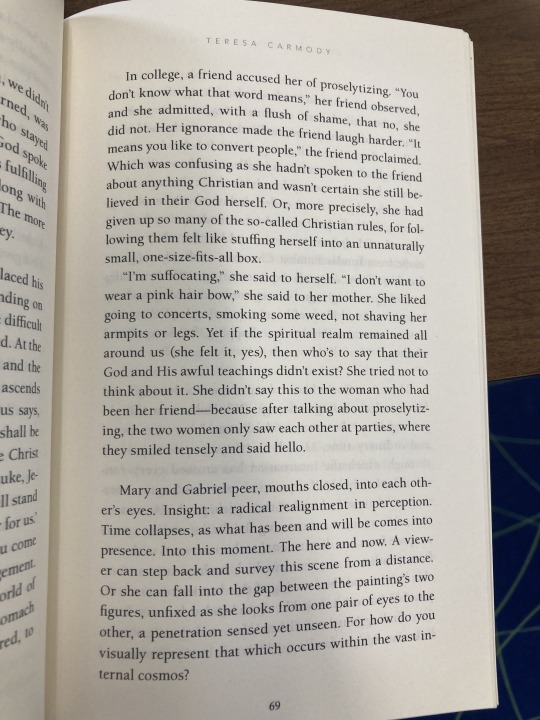
One thing I did find refreshingly real (though unfortunately as sad as it is common) was that Marie had a boyfriend (Chris) who took advantage of heriof the disorganized scope of this novel), and the use of rhetorical questions feels ineffective.
Take a look at the 2nd paragraph on this page and tell me that the pink hairbow/hairy legs dichotomy isn't a cliche. C'mon, I dare you to say it with a straight face. You can't? Me neither. I get what Carmody is trying to do here, I do, but she doesn't do it well. Maybe it's just not the main focus of the novel, but this glosses over so many details, and I'd way rather get some dialogue with the mother over the pink hairbow, the music, and especially the weed. Later on Marie comes home one day (where has she been??) and finds that her mom has destroyed a bunch of her stuff. She's cut Marie's dresses in half, etc., because they're too provocative, but we are never told that Marie even had them in the first place?
One thing I did find refreshingly real (though unfortunately as sad as it is common) was that Marie had a boyfriend (Chris) who took advantage of her in a way that wasn't overtly rape, but was still a violation of her boundaries and pushing the terms of her consent. Marie was concerned that her virginity may not have been intact (my words, not hers) and her boyfriend laughed at her as though nothing had happened. A few pages later, we find Marie and Chris in a Planned Parenthood for an abortion.
Not long after this, the novel wraps itself up as bizarrely as it begins. The last full chapter has weird line breaks, like two words on a line (is this prose or poetry? Not that there's anything wrong with hybrid work, but if you're gonna throw some poetry in there, do it before the very end. It appears on pg 288 and nowhere else in the novel, which is 302 pages long. A bit late to introduce new formats, if you ask me.) (But no one did!)
Finally, we travel back in time to March 1981 for no apparent reason that I can glean, and we are given a few extremely short diary entries that Marie has written, like 3-5 sentences each. It ends with one of those. It's vague, it's weird, and its dissatisfying. The only reason I kept reading this book was because I found it so bizarre that I had to keep going since it was giving me so much to think about. So. There you have it. The Reconception of Marie.
1 note
·
View note
Note
do you personally know any authors who are full time writers ? if so how were they able to quit their day jobs to become a fulltime wirter? I struggle to grasp all the things that are necessary to quit the day job. how do you take such a huge and risky step?
I personally know lots of authors who are full time writers or have “quit their day job.”
Thing is, “full time writer” doesn’t necessarily mean that they are making a living solely off their book advances -- most people I know who are full time writers have their irons in a lot of fires. So maybe they write books, and ALSO write for magazines, or textbooks, or they do paid school visits or speaking engagements, or they teach writing in an MFA program, or do freelance editing or something like that -- in other words, they are hustling and cobbling together lots of random Writerly Things, not just, like, sitting around their beach house writing lovely prose and delicately sipping tea all day.
“Quit your day job” means different things to different people. Like, if you work in minimum-wage retail with zero benefits -- and you decide you’d be better off hustling for yourself as a freelance writer -- the stakes look different than if you have an incredibly well-paying job with full benefits like Health Insurance. If you are 25 and live by yourself, your choices might be very different than if you are 35 with kids to support. You know? Some people have a partner with great insurance and that gives them a bit of a safety net -- some people thrive in conditions that would make others feel very unsafe -- everyone’s situation is different. So there’s no Magic Number of how much you “have to” earn before you quit -- that decision is yours to make based on your own factors.
Basically, my feeling is, you should think about quitting your day job when you are earning enough money writing to cover your expenses and save some -- and when you feel that you are potentially losing opportunities because of the day job. Like, for example: If you got signed on to write a book, and it did really well, and the publisher wanted to pay you a lot to write a series -- but your day job was getting in the way of that -- weigh your options, but that might be a time to quit your day job! Or let’s say you’re making more money with school visits than you make in your day job, and you really want to take on some other cool opportunity but you can’t... or whatever. I don’t know what YOUR situation looks like. But there will probably come a time when you aren’t going to be able to juggle both well -- and at that point, comes a decision.
You can also do what I did when I moved cross country ten years ago. I had been in California and all my friends and family was there -- and I put all my stuff in the car and moved to New York. I said to everyone (and myself), that I was going FOR A YEAR. This was so that, if it turned out that I couldn’t make friends and hated the winter and couldn’t hack it -- hey, whatever, it was just a sabbatical, I can leave in a year, basically just a long vacation! So maybe, if you are in the position to do so and have some savings and such, and you’re already selling books -- frame it to yourself like that. You’re going to give yourself a year’s sabbatical, go ALL IN on writing, and just see what happens. And if it doesn’t work, well, it was only ever going to be a year. And if it does, well... you’ll know!
3 notes
·
View notes
Note
Can you detail you journey to getting a WB pitch? I need some inspiration
I mean, I don’t know how detailed you want because technically this is a journey 18 years in the making …
2001: Watch LOTR: TFOTR. Fall in love with it. Decide this is what I want to do. Not sure what this is but know it has something to do with films. Director? Writer?
2001-2009: Write constantly. Write badly. Write badly, constantly. Act in all the school plays because it’s the closest you can get to film as a 13 year old. Join the media club at school and make shitty short films. Direct two theatre shows as a 17 and 18yo. Write and direct my own play at 19. Join the National Youth Theatre in London and work backstage on a West End production of Mamma Mia.
2010-2013: Go to university for English Lit. Harass the Creative Writing Dept. until they let me into their creative writing classes, even though they have a stupid rule about them not being available to English Lit students. Take two screenwriting classes, alongside a prose class. Graduate and win a UK screenwriting competition with a script I wrote while in undergrad.
2014-2016: Work in an office doing boring office stuff. Work as a PA on British TV show. Work at film festivals. Take an Oxford Uni DfCE YA Literatue class. Take a few meetings in London. Take a UCLA Professional Program year-long class in Screenwriting. Apply to the only two UK film schools worth bothering with. Get accepted immediately by one but it’s the one I’m least impressed with so I don’t accept. Get waitlisted by the big name school who talk about how much they love my script but say it’s too American. Cry. Have an American friend tell me if they say I’m too American then I should just come to America. My Dad says “fuck these UK film schools” and says he’ll help me apply to America.
2017: Can’t just move to America (visa issues!) but can apply to US film schools. American education is very stupidly priced compared to the rest of the world, so apply for a Fulbright scholarship ($50,000). Get the scholarship. Move to America to attend UCLA for an MFA in Screenwriting.
2018: Write a pilot I love with a professor I love. Hear about the BAFTA Scholarship ($10,000) and apply. Get accepted. BAFTA holds an event for their scholars, which includes meeting managers. I meet a manager who asks for a sample. I send the pilot I love. Turns out he loves it too. He asks for a second sample. Loves that also. He sends me a contract. Yay! (Also turns out I was the only person who signed with a manager after that BAFTA event, which shows how tough it is, even when you reach that level.) We work on my samples and continue to polish them ready to send out to the industry.
2019: Scripts get sent out. Start going on generals in March. My second (possibly first?) ever general is with a company who decide they really love me and want to attach me to one of their properties. It’s a book-to-TV adaption. Spend months working with them and a larger studio on that pitch. Start taking the pitch out over the summer. At the same time, I meet with Blumhouse. The meeting is going okay until they suddenly latch onto an idea I mention. They want it, but I don’t really have it. The script’s in terrible shape. I only mentioned it because they weren’t resonating with any of my other ideas and I was getting desperate. Panic-write the script in 3 days. Sell the script. Yay! On another general with a big company. They tell me they love me and were looking to staff me but the diversity hire has gone to someone else. Not willing to give up, I mention an idea I’m working on. They like it and want me to come in and pitch it. Start working on a pitch for my own, original work for the first time. Manager starts sending out the pitch to companies to see who’ll take the meeting with me. Meanwhile, my other scripts are still going out. Warner Bros is interested in one of those other scripts and has me come in for a meeting. They pass on that project but, while we’re talking, I’m determined not to walk away empty-handed. So I mention this other project I’m taking out as a pitch. They really respond. Ask me to come back in and pitch it. Pitch is arranged.
& voila. That is my detailed journey as to how I got my second meeting at Warner Bros. & I’ve actually been on the Warner Bros lot plenty of times before, taking meetings with other companies that have first-look deals with Warners and so have office space there. I really hate the idea that any of the success in this industry is overnight. Like, everyone I know has put in blood, sweat, and tears. But also, a lot of people (for understandable reasons) aren’t willing to be open about all the failures they had along the way. When I was still at UCLA, I didn’t post about my pitches and generals because I understood that I was very lucky and I didn’t want to make anyone feel shitty about not yet having those opportunities. (And I say ‘yet’ because they’re all talented fuckers and it definitely is just a question of time and access before they do get them.)
But now I’ve graduated and people back home don’t really know what I’m doing any more so I’m being more open about this shit. Partly so people back in the UK recognise that I’m still doing stuff, I swear and also because I don’t want to contribute to the unhealthy idea that you graduate from film school and are suddenly a success. So I post on my insta stories every time I have a pitch or a general, and I’m trying to make it more natural to talk about it on here too. I try to make it clear to people that 99.999999% of pitches don’t go but that it’s okay and doesn’t mean shit about you as a writer. Failure and struggle is part of this damn industry and people need to be more open about that instead of acting like their success just magically happened. So yeah, sorry if you follow me on insta and are sick of the pitch posts but I’m trying to do something mentally healthy.
I have no idea if any of this helps for your inspiration, but basically: stick at it, realise it takes years of work, but eventually skill and persistence will win out. (And also know that even if you get a meeting at Warner Bros you’ll still feel like a nobody and a fraud so you may as well enjoy every little part of your journey along the way.)
67 notes
·
View notes
Note
I've just reread ~get the wine pairings~ which is one of the best zimbits fics I've ever read and I was wondering if you're currently working/planning any new omgcp fics? I really love your writing 🙈
Ahhhhhhh wow thank you, there are so many Zimbits fics to choose from, and you chose the one I wrote while my OMGCP AO3 account was still a sock I never planned to link to because it was too many kinks pasted together. I’m very flattered. I’m still weirdly pleased with that fic!
To answer you question -- which I’m also very flattered anyone would ask? -- I've got two OMGCP fics that’ll be going up in the next, like, month:
You may have seen me insanely blogging about this AU where everyone’s getting MFAs at Samwell. In theory, ideally, I guess this would be like a loose collaborative series me and @tomatowrites both write in? (If she wants to/has time to?) I’ve very near done with the first fic in this series, like, one to five paragraphs away from being done and passing it on to a beta. It’s a PBJ sex fic set over Labor Day weekend; Bitty thinks he’s getting into one thing (group sex) but he’s actually getting into something else. It doesn’t get that much into the MFA part of things but I hope it does an okay job introducing the general themes around the Parse + Bitty stories in the AU? Lots of ???? because I’m just so excited about this entire thing. Please send me + Tomato asks about MFA stuff, I’m obsessed with and I want everyone else to be, also.
I’m also doing @omgcpheartbreakfest, and that fic is due on August 5 and should be posting ... a week later? Ish? Because it’s a blind fest I ought not divulge too much about it, but it’s an idea I’ve wanted to write out for a while, so I’m looking forward to finishing this over the next week or two.
and then OH GOD this list continues:
After those two I’ll probably switch gears to finish up this infamous South Park fic. Further afield, I did start an Ollie/Wicks fic that could be conceptually interesting but a) what is the audience? and b) do I really want to expend energy on digging into the tone and keeping the tone on point? More problematic is that these characters do not have personalities or even biographical information to transform into a story, so it’s tough to know what their relationship would even be like? I guess what I’m saying is I’m not sure if I want to follow through on this. Earlier today, actually, I took a look at it convinced I was going to scrap it -- but I also felt like there was something there that made me almost wistful for whatever conviction I had for this story when I started it. We’ll see where that goes.
Two big fics I have wanted to write in this fandom for a long, long time, like nearly as long as I’ve been in the fandom:
An AU where Jack’s OD is fatal, and a few years into the future his mother has established a foundation in his memory, to which she’s recruited Parse to sit on the board, which requires that he help fund the foundation. The foundation creates a scholarship for a hockey player at Samwell, and Parse is asked to advise the selection process, which results in Bitty being offered the inaugural award. The problem, however, is that Bitty is terrified of checking and if he doesn’t make it on this team, there’s a chance SMH might ultimately reject the gift -- and if this pilot program fails, Jack’s mom is gonna, like, have a breakdown. So Parse decides to intervene to make sure Bitty doesn’t get cut? Long story short, endgame Bitty/Parse, with the basic tension coming from what everyone’s lost if Jack isn’t in their lives: the team dynamic is totally different! Bitty thinks Jack is a selfish monster who ruined the lives of everyone around him, but Parse maintains that Bitty didn’t know him. The Bob/Alicia relationship is almost irreparably frayed and Parse finds himself in the middle of it because they both refuse to let him go! In a lot of ways it’s a story about Jack, although Jack is very dead for all of it. If done properly I would love to get into some of the tough politics around, like, money in US higher ed and some politics around wealth generally.
I have mentioned a few times that I want to write a “normal” not-edgelord Zimbits fic, and that would be an AU where Jack gets a PhD in history instead of going into the NHL -- so it’s basically canon-divergent from the start of Y2, where Jack decides that, for his own mental health, he can’t do professional hockey. The fic is set over the summer of 2017, at which point Jack is preparing to take his exams, write a dissertation prospectus, and start teaching in the fall. He’s at an impasse with his advisor, however, who doesn’t want him to write a social history of hockey because that’s a second book project, not a dissertation. While that’s happening, Bitty’s just graduated college and moved back in with his parents while Jack tries to find them an apartment in Boston -- which he’s having some trouble doing since Bitty doesn’t have a job lined up and Jack’s income is like, a graduate stipend. The conflicts in this story come from circumstances external to the Jack/Bitty relationship, and center around Jack’s doubts about his ability and desire to follow through on his stated goals, especially considering he’s deeply uncompromising. I’ve seen so many arguments that Jack would be so great at grad school or being a professional academic and it’s like, yes, in some ways, he would be; I can see him doing good archival research, or moving through the degree requirements in a PhD program, because he’s goal-oriented and willing to put the work in. But! He’s fucking awkward and so much of this field is just ... networking? Collaborating? Taking advice? Listening? Taking social cues? He had this idea about what kind of dissertation he was going to do, and why is he being told no? Can Jack take “no”? Can he adapt? A random woman has been showing up to his beer league games -- maybe this degree wasn’t the right path after all?
Then, all the way down at the bottom here, it’s like, I have sooo many incomplete Greerverse and lady Jack fics, many of them in the 500-3k range, but some of them in the 15k range, which is like, wow, that’s a lot of unfinished fic! The most profitable of these would be Jack and Bitty taking a 15-year anniversary vacation traveling around Europe for six weeks, which Jack unceremoniously kicks off by announcing a desire to transition--and then saying nothing about it for the duration of the trip while Bitty tries to work out how he feels about this, never mind what Jack even wants.
Aaaand last and probably also least, I’ve got like 15k each of an a/b/o fic I tried to write for Tomato and another 15k of a fic where a career- ending injury leads Jack to reassess his entire relationship with his body and therefore he winds up getting a little drag-curious, and it was fun writing about like, Jack moping around the house on crutches feeling sorry for himself, but also the fic has an OC who’s a big part of the story and I just didn’t feel that guy or care to write about him so I quit! Maybe I should scrap those things, along with the rest of this mpreg fic.
So that’s where I’m at ficwise right now! Who knows a) when the things further down this list would see the light of days, and b) which other crazy ideas will crop up that I have to write in the interim?
Thank you so much for asking! I love chatting about my fic, please ask any time.
4 notes
·
View notes
Text
Artist Interview #1 - Jérôme Nadeau
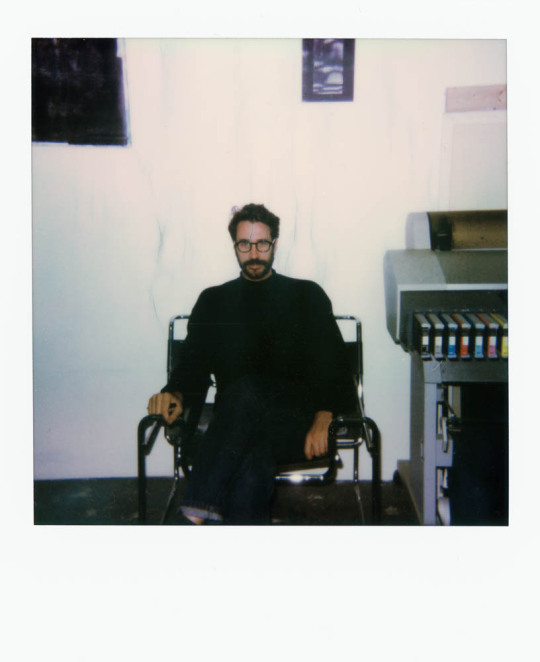
William: So for redundancy's sake just I guess introduce yourself and the basic gist of what you’re interested in your work.
Jérôme: Yeah so I’m originally from Levis, which is across the river from Quebec City. And I moved to Montreal about 10 years ago to go to Concordia in Photography. I did my undergrad there and I did an MFA there that I finished two years ago. I also studied during my MFA in Gothenburg in Sweden. While doing my MFA I also a thing called Soon.TW which is a publishing house and then two years ago when I finished my MFA we actually turned the project into a contemporary art gallery which is right there. And at this point we decided to take over this space and turn it into an actual physical space. I was joined by two artists Jean-François Lauda and Nicolas Lachance, and then at some point in the process there’s Simon who joined us. Simon was in Chicago doing his MFA, we also studied together we did our undergrad together and then he moved to the United-States and came back. So we started that project. In my practice I’m interested in photography and like I said before, mostly in the process of photography so what’s usually left unseen from the photographic process. Exploiting photography for what it is. Kind of a challenging indexical link with reality.
William: Did you start your art experience with photography or?
Jérôme: No I actually started, well in Cegep I studied film-making and by the end of that I realized I was never going to do that. I’m still really interested in cinema and yeah I still think it’s the most amazing medium in the way that it has this kind of capacity to attract mass media even with very kind of-
William: Artistic?
Jérôme: Yeah artistic aesthetic or philosophical kind of questions and it’s something that goes beyond any other medium which I think is interesting but it’s this thing where you have to collaborate with many people and I don’t know… I’m not a fan of that industry which is something that is always a long process to be able to achieve that and I saw that coming quite early. I mean what you need to do to be able to make it I guess in this world. At this point I finished studying filmmaking and then I went travelling to Australia. And I was like should I buy a video camera or a photo camera and it was kind of at the beginning of digital photography being kind of affordable so I bought this digital camera for a few hundred dollars which is now completely obsolete. I’ve kind of learned to photograph through that, like there was a manual mode and I started to kind of experiment with it and I really-
William: So then you learned photography digitally before eventually going back to analog?
Jérôme: Yeah exactly but again I was at this point interested in abstraction. I remember the portfolio I submitted for Concordia for the undergrad was a lot of like longer exposure and colourfield photographs and it was all not necessarily very straightforward and I was also very interested in painting but I have absolutely no talent in painting and no patience to…
William: To get better?
Jérôme : To get better and I’ve never been formally trained as a painter so I like I remember as a teenage kind of, like in the backyard making this huge kind of Riopelle painting. Like I had a lot of fun with the process of painting but just, yeah I was lacking this kind of training that would allow me to get better. Or be able to actually do-
William: Like take something from your mind and put it onto the canvas?
Jérôme: Exactly, exactly. It felt like it was really limited but I was very interested in painting and I remember I had an art history class and I was interested actually with Canadian painting. Painters like Riopelle and stuff like that. I remember Riopelle because he died on this island called Isle-aux-Grues which is not too far from Quebec city, it’s in the middle of the river and my mom’s cousin has a house there so yeah I just remember seeing his work and at the National Museum in Quebec (city) and being kind of… really transported by his practice. I never really had a contact with art growing up like my family was just more involved in sports and stuff like that. So I remember walking into that museum and just kind of, I don’t know, really amazed by that painting. You know what I was saying about cinema? Like I kinda found a little bit of that in his work you know so I was just feeling stuff and is that even possible? Like you can’t really understand that from just reading about it or having a slide lecture in Cegep about it. So I was kind of mystified by that in a way but then again it was such on a large scale so this understanding of materiality that was kind of beyond me.
William: So do you think that experience informed your future work?
Jérôme: Oh yeah it informed the rest of my life. Like I remember that moment and they still have that painting in a permanent collection and I go back almost every year to see it. And there was this big show he did at the end of his life called the: “L’hommage à Rosa Luxemburg” because he had this relation with Joan Mitchell, the American painter, and when she passed he started this 120 meter long painting that’s an homage to her and it was shown in its entirety. It was bought by the museum now so it’s on permanent view and last year they actually made a show of Joan Mitchell and Riopelle too which was kind of interesting. So yeah I grew up with that-
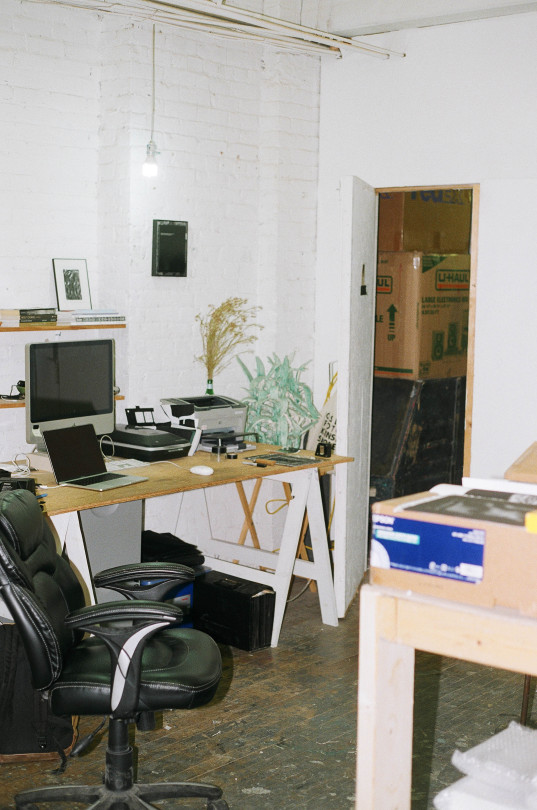
Wanda: How young were you when you saw it?
Jérôme: I was in High School when I saw that for the first time so it just stuck with me and this kind of part of my life life where I started being more aware of like… culture in general but at this point there was internet but it was harder to find independent movies and even in Quebec city to find this kind of more edgier stuff.
William: And yeah especially in Levis too.
Jérôme: But a young age I started working in Quebec and getting involved in music a lot too. The electronic music scene was kind of beginning so I started being involved a little with film-making and a lot with music at this point. So you know I started making music, producing music, it was the beginning of what they call laptop techno. So you were moving on from vinyl and actually the programs like Live just came out and so it was quite easy to make music in your bedroom.
William: Do you think music still informs your work in some way?
Jérôme: Yeah, yeah totally. I mean not necessarily in terms of production because when I moved to Australia there was this, I don’t know, it’s still pretty expensive to buy records and just kind of constantly invest in all of that so I decided to travel and I started focusing on photography and when I came back I applied for Concordia while I was away and I got back and moved directly to Montreal to study. So I already made my choice to pursue visual arts and that music was not going to be a number one priority but its always been there. Like I’ve DJ’d for the past 15 years as a side job so I think it’s more this aspect that informs my work. Well not that it informs it but I feel that-
William: Do you work with music? Like in your space?
Jérôme: Oh yeah I listen to music all the time like if I don’t have my headphones there’s a good chance I’m not going to the studio. I know that there’s a lot of artists that can’t work with music but with me it’s just the opposite.
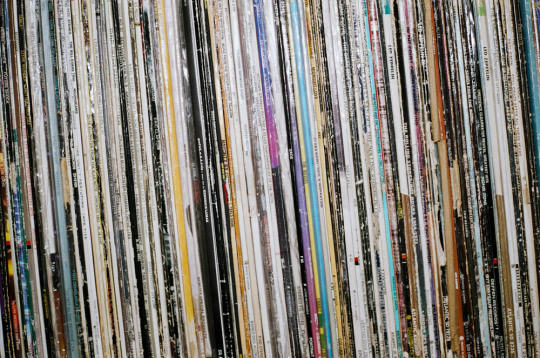
William: I kind of feel the same way when I do any sort of series I make a playlist specifically for it and I only listen to it when I working on it.
Jérôme: Yeah, sometimes I’m not even listening like I know, I don’t do it here as much but when I was doing my MFA I had a studio in a basement of the VA so there was no signal whatsoever so I could listen just to the same song over and over. It’s just you know especially physically when I’m working you don’t really listen to it. And there’s this thing where I feel, not with painting but with working even just on the computer, where you really get in the zone of something. Like it just feels like a different state of mind and there’s a lot of exterior signals that can be blocked out. But I just feel that music is just filling this weird void and it just allows me to focus. But sometimes you know if I do more quiet operation I listen just to white noise but I need something-
William: So you just essentially need noise?
Jérôme: Yeah
William: Does it, like are you looking for a mood or just a feeling while working or?
Jérôme: Hmm not necessarily I mean it informs what I’m listening to. But yeah it just gives me this form of energy. Especially when I’m working with headphones, it feels like I’m really blocking out the exterior and allows me to go deeper with my thoughts and with what I’m doing. That’s the only thing that’s happening is what I’m doing right now which is nice.
Wanda: If you’re in the space by yourself, do you ever listen to the music with no earphones?
Jérôme: No, no, then I get scared because someone would walk in and I’m just there with my headphones playing super loud.
William: Yeah I can only work with headphones too, I think it’s the physical part of having something in your ear that help block out those signals that you were talking about.
Jérôme: And when I’m writing I can’t really listen to any music, it has to just be sound. Or I have earplugs too sometimes. So I think it has something to do with my ear, maybe they need to be blocked.
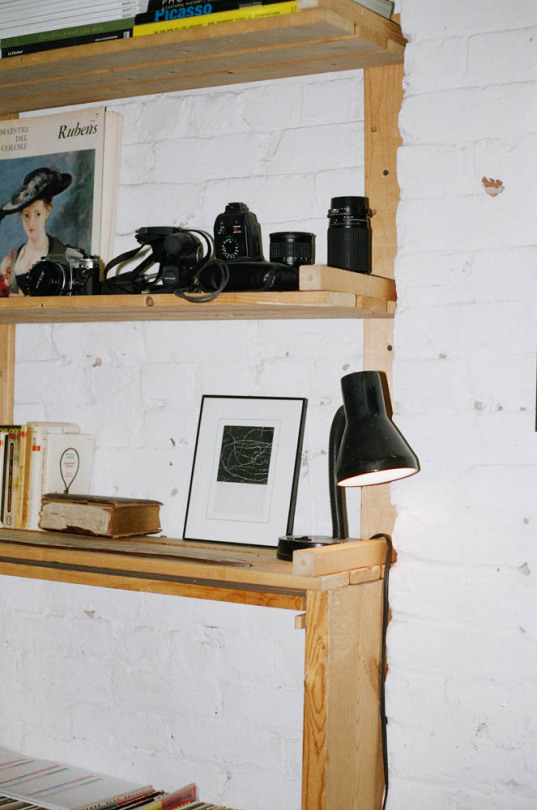
Wanda: How do you see yourself or express yourself through your work?
Jérôme: To kind of go back to what I was saying with music and cinema then photography. I started at Concordia and the first thing we’re doing in the 210 class, you start working in the darkroom. Then I got really absorbed by the process of it. Like being in the darkroom. Especially starting with a digital camera where you take an image and then you put it on the computer screen you don’t really question it. It just appears there and it’s kind of magical but you don’t really see it as a physical thing. Then working in the darkroom and learning the basic of the film and I was really interested in the colour theory and physics behind photography. The mistakes that would happen in the darkroom too because there was a lot obviously. But I feel like something that informed my work up until now is following what messed up and try to accentuate it and always playing. I feel like the more I learned about the process of photography the more I could dismantle it. To just focus on certain specific areas of the photographic process.
So I guess what I’m trying to achieve… it’s a really hard question. It’s not that I don’t think I have anything to say. I just feel we feel in really complex times. Specially medium specificity and setting up these things it’s the process of photography that’s speaking for itself it’s not necessarily me. It’s funny because it’s always what I’ve been interested in, just the process, physics, and theory. And someone once mentioned to me it’s also a way of hiding any sort of personal expression from the work which could or could not be seen as a reflection of my personality. But coming from that person it really stayed with me. It’s what really motivated me a while later to introduce the writing in the actual work. So it’s a way to make something about the process a bit more personal through poetry and through self-expression that I feel a strong connection through poetry and visual abstraction. I feel that it’s functioning the same way. Obviously one is more visual than the other one but I feel the end process in your brain is quite similar and I thought it was a way to do that. And obviously even that isn’t really straightforward but for me there’s a connection to an event or a moment or person, something like that. It could be reflective, even if it’s abstract. I can look back at older work, me having produced that, it’s a moment in your life and it transports you to where you were. But for everyone else it’s not possible to achieve that. So I feel that leaving little clues can make that happen.
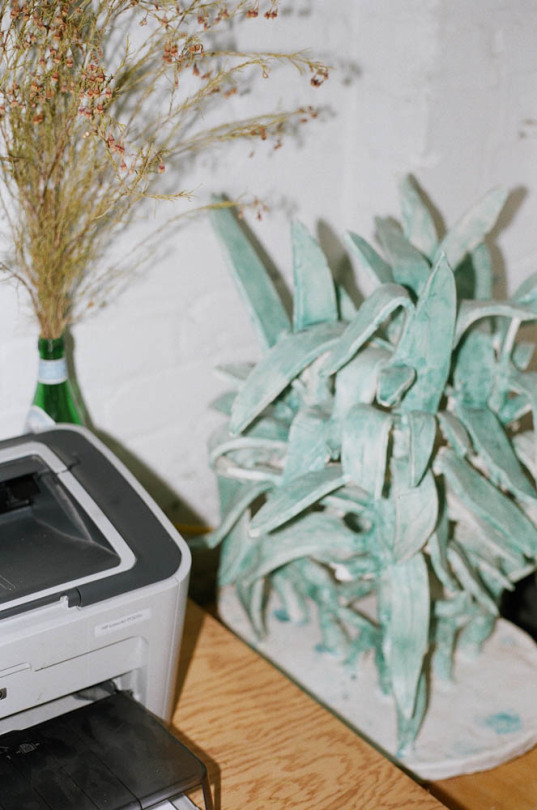
William: When did you realize you needed to have a studio space? And when you were trying to find a studio what were you considering? Did the image in your mind translate into reality?
Jérôme: I’ve always wanted a studio space. I was hanging around painters and I mean I had a studio in my apartment for awhile. I lived with a roommate and we had this huge apartment so I took the dining room and made it my studio. But at some point I was working with chemicals so I had to work outside and it just wasn’t convenient to do that in your own house. But I mean I was obviously restricted by budget and when I started the MFA I was pretty excited because you have a studio. Then I realized in photography you don’t really have a studio it’s an office on the same floor as where the labs are so I was pretty disappointed. But I started working in the spray painting room and using that but everything was scattered and always at school so it didn’t really make sense to have an outside studio at this point. When I moved to Sweden I was told it was the same thing that in this program you have this huge studio and some people even lived in it but when I moved there they decided to transfer me into the photography program and the photography program only had offices too so I was like are you kidding me. But they found me a little place in the basement where I could work and I came to Concordia and I applied for a studio in the VA which is more of a traditional space. I could do anything, and I really liked it. It was really small. Maybe half the size of here, no windows, I would just close the door-
William: And it was kind of like the earplugs?
Jérôme: Exactly. I could just close the door, no computer, it was just work. So I feel it was a really productive time. Then after your second year of your MFA you don’t have access to a studio anymore so you still have access to the facilities but you don’t have a physical space that’s assigned to you. So during that summer, my friend Étienne was subletting from Alexy and was going to Glasgow. So it was a last minute thing. I was working and I asked him what are you doing with your studio when you’re leaving? And he didn’t know so I was like ok I’m going to sublet it from you. So I worked here for that whole summer. It was while he was gone that the lease was transferred through Vincent. And Vincent asked if I wanted to stay since we’re doing this photography based studio and I said yes. Étienne came back and for a few months I was in a corner and we decided to share the space for that time.
Wanda: You’ve had studios with other people and by yourself, do you think you express yourself differently when you’re sharing a studio versus when you have a space to yourself? Also do you think it shows in your work?
Jérôme: Yeah totally. Now that you’re saying that I’m thinking that I had another studio for a few months in that building on Van Horne & Parc but it was before they renovated it. My friend he had a studio there for a year but the studio was maybe as big as both our studios here. There were like six people there And he had this big table and he’s doing collage… but I never actually worked in there I used it as storage because it was at the moment that I had to leave the studio at Concordia before I found it here. So I moved some of the stuff from that office there. But when I found this studio it was pretty much empty, just a few paintings tossed up along the wall so I had this whole 600 square feet space to myself. So I was like yeah...yeah I don’t want to be with six people in a small space. But sharing the space with Étienne was great because we were really close friends and we had the space open and it was messy. We had a beam here and he would hang stuff so there was some separation but then we decided to build this wall so even though it’s a shared space it feels pretty private. I can just close the door here and work without being disturbed. We’re also pretty quiet and respectful here so if someone is working we don’t just knock on the door for anything. Especially being here, it happens quite often that people leave and don’t even know so they lock the door so it feels like it’s my own studio.
It’s also pretty convenient with the gallery being there because I can work while tending the gallery. And now it’s pretty necessary because we sometimes have to use the studio as storage space.
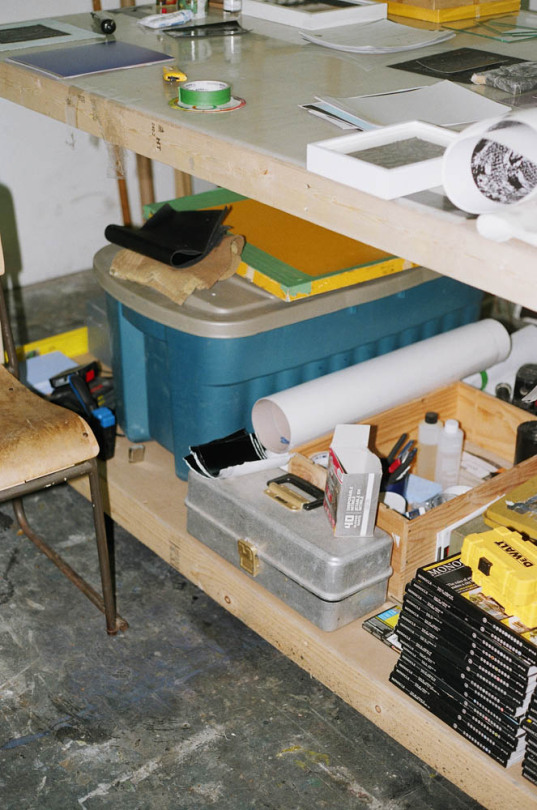
Wanda: Do you see a change in your work when you’re working in a studio alone versus with a lot of people?
Jérôme: I couldn’t really do it with a lot of people like let's say right now I’m working on a lot of different stuff at the same time so there’s a lot of stuff that’s not resolved and I don’t necessarily want people to see that. And it’s where having the gallery is a little inconvenient because if there’s a vernissage we’ll do a bar here and it’s open so I have to clean. I don’t want this stuff around that I don’t want people to see. But then again I could decide to leave it closed but I don’t really mind that. I think it’s actually something that’s a good exercise, knowing that some people are coming over. Like if you’re having a studio visit you can pull some stuff out. Especially when you’re in the process of making your work, to look at all your work. It informs you And the way I work, I try not to work series even though it’s really difficult especially when it comes time to mount a show and propose a show. To dig in a whole lot of different processes and see how they talk to each other. And that, to follow back to what you were saying about music, that’s where I find a link. Especially with DJ’ing and mixing. There’s a whole lot of digging and using things that you couldn’t really see together and when you put them together there’s this dialog that opens and goes beyond the individual work that starts to speak. That’s something that I like, it’s not really something that you can see and just sit down and say oh I’m going to do that. Sometimes it’s just by chance, I’ll be pulling stuff out from boxes and then I look at them and say “oh my god!”. It could be formally or in the content or me and how I see it, but there’s a connection happening. That’s something that I really like and try to do and so when people do come over it’s a chance to do that and rearrange and look at your work in a different way.
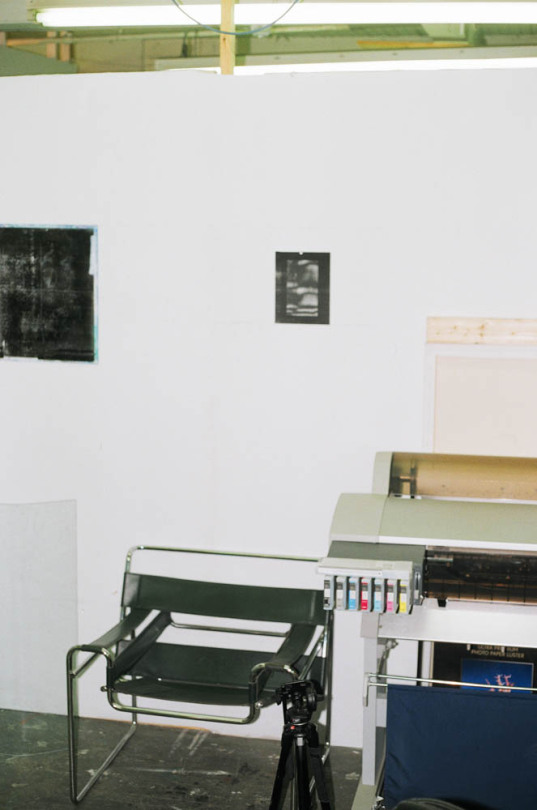
William: Since you’ve already built and organised a studio, is there anything that you would warn against to anyone building their own studio or just general advice?
Jérôme: I guess it depends what you want to do. I guess build clever storage. Here we’re pretty lucky because it’s outside the studio but I feel before we had built that storage space I had accumulated stuff from Concordia, from the studio I had at my house, the studio I had on Van Horne so there was stuff that would pile up and it’s nice to be able to have storage. But then again I would advise against keeping too much stuff. I feel that again with the studio visit it helps to at least once or twice a year to do a cleanup. Go around the studio and get rid of stuff, it’s important to keep some because you’ll never know what you’re going to need but personally I feel I tend to hold onto things for too long and it just weighs on you. So it’s nice to clean everything out and get a fresh start. Which is something that if you go on a residency like when I went to Sweden I don’t have a studio I have nothing at this point. So you can very easily restart and you’re not starting from nothing you still have all these ideas and everything you’ve previously done that’s in your mind. That’s usually where it starts and you can start to experiment with new material and new ideas and I feel it’s nice to provoke that sometimes. Like I’ve rebuilt the table this summer and I completely emptied everything out and took everything out of the storage right after a show where there was tons of accumulation of images and tests. And I decided to move over that I was done, time for a new chapter. So yeah, be organised with the way you’re putting stuff in storage because oh someone wants to see a piece they saw online and you want to rework on it and you go and try to find it and it’s in a box that isn’t labelled. It’s quite a nightmare sometimes.
William: Is there anything in here that if you had absolute omniscient power to change anything in the room, what would be the one thing you would get rid of, add?
Jérôme: Repaint the wall and plaster everything. Especially because it’s years and years of oil paint. If I could sand it all out. And while I don’t mind the floor being dirty it’s just that it’s not sealed and has so much dust stuck to it so I would fix that. Maybe the ceiling too, make it more soundproof. We’re pretty lucky now it’s quiet I don’t know what’s happening maybe they’re freaking out because they know the building just got sold. I don’t know what they do but they I feel like they always have these I think it’s clothing racks moving and it’s almost scary. Probably why I’m listening to music so loud all the time but sometimes it’s annoying.
Wanda: Do you personally feel as though you work better in situations of controlled chaos or very tidy?
Jérôme: It’s a mix in between, like Étienne that had this other part of the space, have you seen Francis Bacon’s studio? It was exactly like that. A mountain of fucking shit he bought from Dollarama and just complete mayhem. So you know when you look at my studio compared to that it was the most organized thing in the world. But it’s always a play between resetting everything. Everything is organized and cleaned up but I need stuff laying around to play with and remind myself. So it’s cyclical. I would say I’m quite organized but I’m not insane about it.
William: Yeah you’re not like Georgia O’Keefe levels.
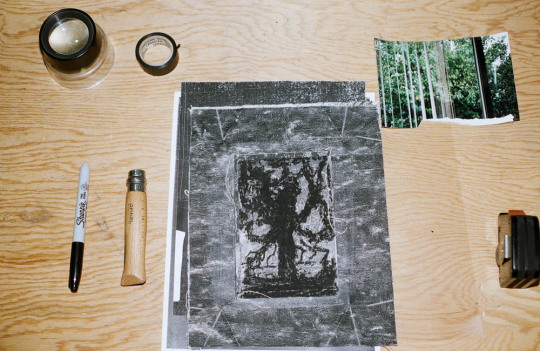
Jérôme: Yeah exactly, I wish I was like that. I’m like that in my house but here, maybe if I had a bigger space I could do that and I’d have a clean area. An area for printing and an area for experimenting with other materials and dirty practices. So I feel I could do that. Have an area that’s restricted by different processes.
William: What do you use most often in your studio?
Jérôme: I mean computer I guess but I wish it wasn’t that answer.
Wanda: So how long did it take to get the studio you wanted it to be or are you still evolving it?
Jérôme: It’s changed a lot. Like we built the wall a year and a half ago. So that changed a lot. When I got the printer I changed a lot of the configuration. I mean I’ve accumulated a lot of stuff. There’s also a moment where I was living in this really large apartment and I moved out so there was a lot of stuff like books that I had at my place that I moved here or in the storage. But I feel like it’s been like this since the summer, like I said I rebuilt the table so I built this platform underneath that works as storage. So it feels like it’s constantly changing.
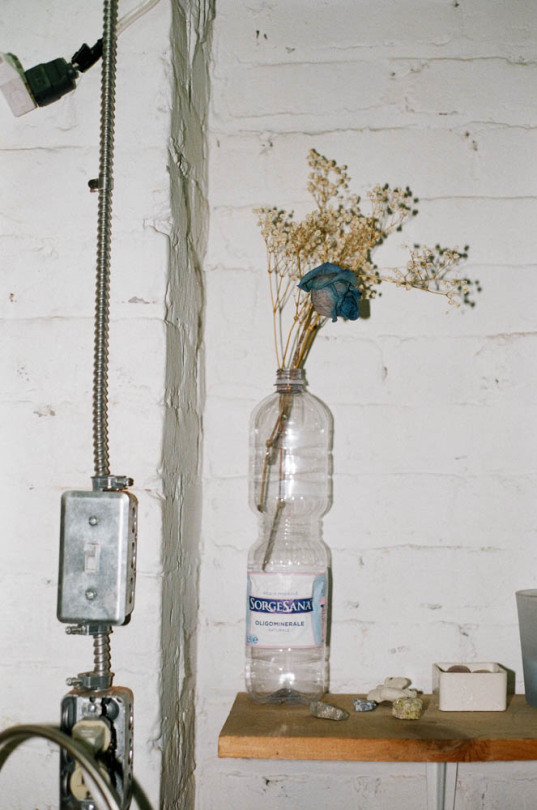
Wanda: Did you have any inspirations when building it? If so who were your inspirations?
Jérôme: No, I mean it was about practicality. Stuff that I found. Nothing really belongs to me here. Like there’s some wood panels that I found and this someone gave to me [legs for desk], and there were so many ex tenants that left wood that I used to build. Lot of finding stuff. Even the table I mean most simple studio table you can build for cheap. If I could build the ideal studio I guess the inspiration would be Donald Judd’s studio in New York and Marfa. He even left instructions when he died like the little rock there and the pen. He was a collector and has all these books, built everything and designed everything himself. If I had more space I wish I could do that. Even here doing renovation, you start cutting wood and there’s wood chip everywhere.
William: And the into the floors must be a nightmare.
Jérôme: Yeah if I do that there’s also the other studio so it’s a bit difficult. We’ve been through quite a bit of renovation. Painting the walls and rebuilding the whole gallery space about two years ago.
William: Universally, what do you think is a must for any studio? Like one thing that every artist should need.
Jérôme: An exact-o knife.
William: And what do you use yours for?
Jérôme: For everything. I don’t know. Not that I’m dealing with collage but like if you need to cut a piece of paper. Mine was lost for awhile, I left it in my friends car-
William: And you were lost without your exact-o knife?
Jérôme: Yeah and it was a really good one with the black blade that I paid thirty dollars for. And he said like “oh I have the same I kept it” and he never gave it back to me now that I think about it. I feel like it’s the thing that especially after realising that it was gone for awhile.
William: You don’t know what you have until you lose it?
Jérôme: Yeah. Yeah. So I guess that and headphones.
Wanda: Do you find yourself stressed when you’re working here or do you find that it relaxes you?
Jérôme: I don’t think the studio informs that, it’s more about what I have to work on or if I have a deadline.
William: Is there a part of the process that you dislike or like more than another one then?
Jérôme: Not really. I like starting a new project because usually you have more time and it’s easier to place your ideas and there’s this playfulness. But I also really like the last stretches, putting up a show and deciding. Having people over looking at your work and seeing what you’re going to present and doing studio visits that are really directed towards what you’re going to show. I really enjoy that when everything is done. Like I was saying when I was doing my MFA I was working with my teacher and adviser a lot. I would just bring boxes and boxes of work that I had done throughout the year on her table and we would play with it. So I like that. And I try when I’m working to not overthink it. I just get it out. Work and experiment, get stuff out. And then when I’ve accumulated enough and I find something that makes sense I can take a step back. Start to think about it, see how it situates with ideas and theory and see if it makes sense. If there’s anything happening between the works.

William: So then is there a prevailing emotion when you’re in here or is it really just based on what you’re currently working on then?
Jérôme: I guess it really changed throughout the years. Like at some point I moved out and I was I was in this weird thing where I didn’t have anywhere to stay. It was just a lot of change in my life. So the studio became this place where I was here everyday. I would just work a few nights a week. I was just here all the time so I think it was not really good because it just became my second house. Like I would come here even though I didn’t really have any shows planned. Work on the computer, make some tests, and then Jean-François would be here and we would just hang out and there was the gallery so I wasn’t really coming here to work. But again I feel like it’s sometimes good to be in the studio all the time. I kind of miss it. Like sometimes I would put that on myself. Like this summer it was insanely, insanely hot in here. It was unbearable so there was this whole month after a show where I told myself I can’t be in here. I’m forcing myself not to be in here. Because sometimes you want to work on something but you know you’re not in the right state of mind and work for nothing. So it was nice to miss it and when I came back and put everything in order I felt this renewed energy from me not being here everyday for a whole month when it was 45 degrees.
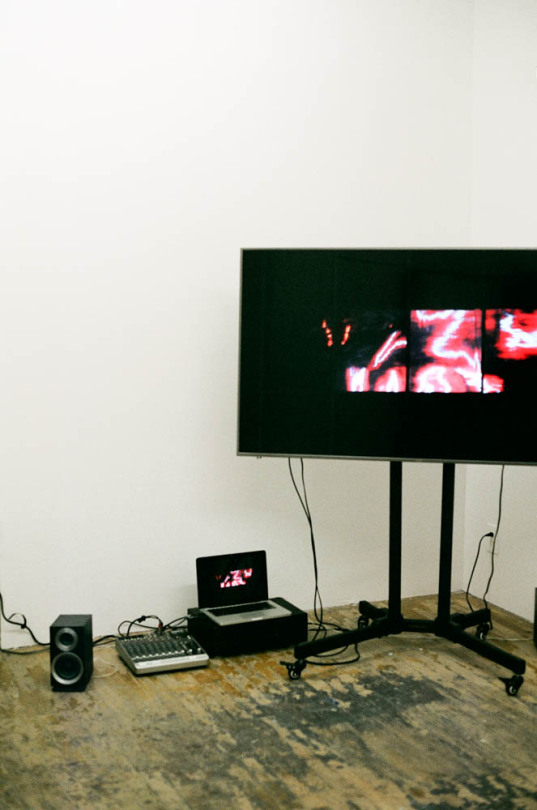
William: Did you work outside of your space during that month?
Jérôme: No I just read, researched, and prepared the class for Concordia and thinking of the facilities there. So how I could work there. So it was more like making lists of things I wanted to do with those facilities, knowing that I would be here and that I’d have access to a lot of stuff I didn’t have access to before.
William: Do you think then that it’s important to sometimes take a step back away from your studio space and organize your thoughts?
Jérôme: Yeah for sure. Since it’s hard for you to do that when you’re in the space working. So it’s nice to impose that on yourself as a constraint.
Wanda: Do you have any recommendations then for people who can’t afford to have a separate studio? Like a lot of the times they end having a living room or in their bedroom, do you have any advice?
Jérôme: Yeah I’ve done that for a long time and it’s personal. I know a lot of people love to have their studio in their space. With the winters it’s more convenient. I like the idea of going to work but I know it’s a lot of money and not only that you have to find a studio not too far from your house. Who you want to be with, who are you going to be sharing with? So there’s all these questions. Like mine was in my room for awhile… that I would not recommend except you can’t have it anywhere else. It’s nice to keep your room for sleeping, it’s healthier that way. But then I had this dining room that after a year we made diner and invited people once so I’m taking it over and I was paying extra and my roommate had a bigger room so it was this common agreement we had. It just made sense and it doesn’t have to be big it just has to-
William: Be somewhere to be productive in that space?
Jérôme: Yeah and your stuff is there and you know that when you go there you go there to work it’s not like you’re working from your couch or your bed. I even do that for writing like I can’t write in here.
William: Because it’s more visual?
Jérôme: It’s more visual, like I always want to work on something else when I’m here like I look and there’s all these ideas and I need to be in a neutral space. Like the library is good for that, in my house I set up a space where I write so it’s nice when you have a space dedicated-
William: For specific tasks?
Jérôme: Yeah specific tasks, function. When you go there it feels like your mind is already settling into that mode. Even reading like I don’t see the point in coming here to read, I’ll go to the library, a cafe, or outside if I can.
Though actually if I could change something about the studio I wish there was more space where we could do this and be more comfortable. Have people over. I know Marc Seguin would invite people over all the time; collectors, curators, friends-
William: Have almost like a social space, like an old coffee house type of thing.
Jérôme: Yeah and again with Jean-François it was always like that. End of our day and just have a beer so you hang out and it’s nice when you have the chance to do that. Have conversations and talk about your work.
William: So you think it’s important to be able to have that social aspect?
Jérôme: Yeah I guess it’s really personal but I feel like, I give meetings with people here and most of the time it’s convenient because I’m here working. It’s another reason why having a studio outside of your house is nice because I had studio visits at people's house and you like judge everything it’s not comfortable for the other person for like an hour just standing there in someone's house. So it’s nice when ok you look at peoples work but you can sit down and relax, talk. But yeah it’d be nice if the space could function like that. Because collectors and curators you’ll have studio visits like so to be able to make the space as nice as possible would be cool. Also makes it go for longer.
William: Like ow my legs are hurting
Jérôme: Yeah and the chair is full of paint and you don’t want to touch anything. But then again some people might like it if you go to place and it’s just mountains of shit laying around and work.
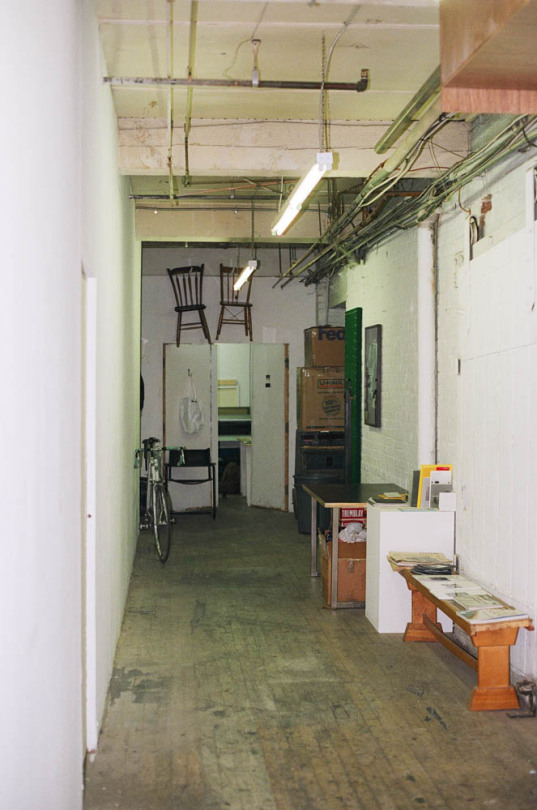
William: I mean personally I wouldn’t want to go to Francis Bacon’s studio. That place looked insane.
Wanda: I would love to go like you’ve seen my room I wouldn’t be too upset.
William: Yeah but can you imagine doing a studio visit there just standing there for hours?
Wanda: Yeah can I move this pile of trash to this side of the room for one second!
William: It’s not trash, needs to be right there!
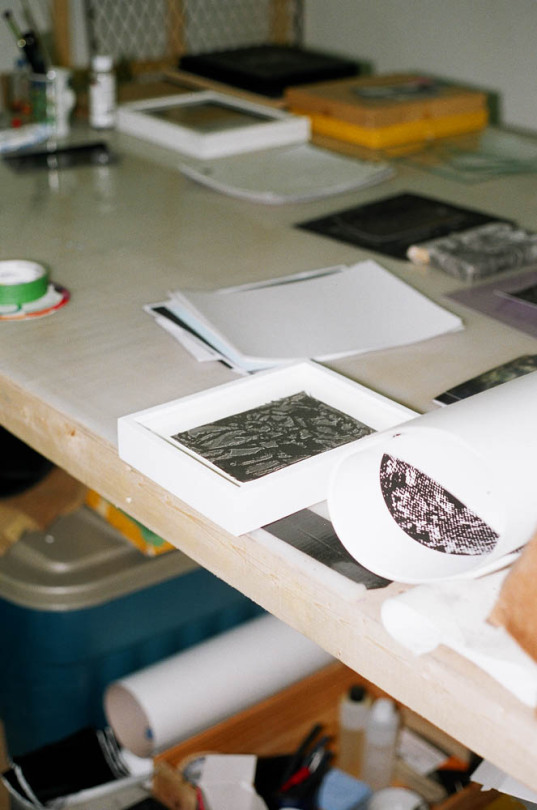
#artresidency#artistseries#montreal#montrealart#artstudio#artistspace#artist interview#interview#film photography#photographer interview#canadian art#quebec art#concordia university#concordia
2 notes
·
View notes
Text
this is some personal shit that’s been preying on my mind for a while and i need to lay it out somewhere; some interpersonal issues and Artistic Struggles behind the cut
someone I considered one of my best friends told me a few years ago, when u pro o was the only thing i had going, that I shouldn’t be spending my energy on writing fanfic, and should be focusing on my “real stuff”
at the time I was able to put it out of mind, because fanfic was my only outlet at the time and I had a really good community and I assumed the “real stuff” would come later; the friend was in an mfa program at the time and had a lot of artistic support, and i only had our fanfic community as my writing support and was getting a LOT of support and was learning a ton
but it’s always sat in the back of my mind
(i know now that my fanfic is as much “real stuff” as the ~original fiction i write but anyway)
a few weeks ago, after a few years of not being in touch a lot, i reached out to the friend just to say hi, because i missed her and was thinking about her, and she wrote me back asking me to stop reaching out, because she felt we were in different places.
we’d been friends for more than half our lives, so this was...crushing to me. but of course no one has to be my friend if they don’t want to be and she is allowed to set a boundary! so i just wished her well and have been trying to move on. (if anyone reading this knows what i’m talking about, Do Not Bother Her About Me, I mean it, just don’t, my feelings are not her responsibility, they are entirely my own and i’m just trying to process here and maybe get some advice from people who’ve been in a similar situation.)
but of course, since i don’t know exactly what prompted this, my anxiety just Will Not Let It Go.
she had something really awful happen in her personal life a few years back, and i know i dropped the ball in supporting her; i don’t want to make any excuses for my own behavior. i had assumed she’d rather get support from another mutual friend who’d been through the same things, which i feel now was wrong of me. my chronic illness has also been getting worse over the last few years and i’ve withdrawn a lot, and when i was dating evan he was a priority bc i wanted to marry him, so i was not very present for friends in ways i now wish i had been.
and there are a million other things it could be, naturally; could be my politics, could be maybe i’m just not fun for her to hang with anymore; could be a lot of things that are perfectly reasonable decisions for a person to not want to put time/effort into a relationship anymore. she is also black and i am white, so there could be things there that i am oblivious to because white privilege, and i am not discounting that i may have done something racist that made her decide, ok maybe not anymore. i do my best but i know i fuck up. of course i can’t know anything about what prompted this, and i’m trying just to be like “i will move forward in my friendships more consciously, and do my very best from now on” but, like, still have a Feeling that i am working through, doing my best just to work through it on my own and not Emote at people or god forbid white tears(TM) about it. i do not want my pain to be used as a weapon against anyone, and that includes not weaponizing it myself.
but a part of it is--this friend has had enormous professional success in the few years since the conversation I mention above. part of why I drew back from the friendship was--I am not proud of this--jealousy. I did my very best to support her and be happy outwardly, but i was really envious, and didn’t know how to act. we’re young, I’d never dealt with anything like this before, I handled it badly. I did my very best not to let it interrupt our personal friendship, but it probably did. like, I can’t blame her for pulling away if she felt that; I do my best not to do it now with my other friends, and I hope she knows in some way that I am really proud of her and happy for her, even if I couldn’t show it well at the time.
anyway now i’m in my MFA, and i feel like i’ve been doing well, but since this breakup email i have barely been able to write a word, on either my manuscript for school or any fic just for pleasure. every time i try to work on my manuscript, i’m like “what if Friend has rightly told industry people i was a bad friend” (i do not think she would, i have always known her to be a very kind and generous person, this is just Anxiety Brain Catastrophizing), or “what if this is just Not Good and no one will ever like it”
and then if i try to take a break and write fanfic I just keep replaying that conversation from a few years ago, like “it’s ridiculous you spend your energy on this stuff, you’re not a serious creator and this is why Friend doesn’t like you anymore”
it doesn’t help, of course, that this breakup email came three days after my grandfather died, and a week later a friend in my MFA cohort passed away incredibly suddenly--we had been in this program together and done a lot of writing together, and her books were phenomenal, and now she’s just gone and it’s horrible and unfair. so i’m grieving my grandpa, and my friend, and this longterm close friendship, and i know that’s just a Lot to handle right now. i’m trying to be easier on myself. it would just--be easier if I could write. but I have all these awful intrusive thoughts every time I try to.
so--idk, I’m just trying to process this some. like any breakup when you’re blindsided by it, I know I’ll never know exactly what precipitated it or what was going on for her, and all I can do is move forward and be better and kinder in my personal and professional relationships.
it’s just--this manuscript needs to be in some completeish form to hand in on May 1st, and i want to be able to sink some good effort into it. i’d also like to just--scribble a bit on some fic, because it’s my goddamn hobby and i enjoy it. so hopefully this post will function as a kind of exorcism, a longform cleansing spell that will get some of these thoughts out of my head and onto an easily contained page. nobody likes a negative nelly so gtfo, etc. i am a writer and i am good at what i do, so i’m going to just keep trying. tyfyt.
#personal#seriously do not feel obligated to read this but of course if anyone has advice i appreciate it and love you#really thanks to y'all for having my back for all these years#the garrison is a Good Community
26 notes
·
View notes
Text
february pinned: the real & the ideal
in this month’s edition of my lowkey writing-related newsletter, in addition to my writing-related post roundup and consultation availability, i have short story recommendations for you and an essay on the nature of reality in fiction!
if you want to receive my lowkey writing-related newsletter directly, you can subscribe here.
in other news, i finished two fics this month:
digging for orchids (hualian, 43k, explicit, fake marriage au)
let ruin end here (hualian, 8k, mature, neighbors au)
full newsletter below the cut, or you can read it here.
oof,
what a month. january is already a rough time. throwing in a pandemic, a coup, and an economic revolution spearheaded by reddit just seems unfair. as for me personally, the spring semester came at me fast and even though it’s only week 2, i am already buried in grading. which i realize is my fault, considering i’m the one who assigned homework.
so after hearing your feedback, i thought i’d make this newsletter even more writing-related by writing more about writing. this month i’ll start off by talking about the nature of reality in fiction in a segment i call “been thinkin a lot about.” more on that below.
new resource
i’ve compiled a folder of PDFs of the short stories i teach most often, which is to say, the stories i like enough to re-read every semester. most of them are literary fiction but a few veer into fantasy, sci fi, and horror.
i know before the MFA, i didn’t really know what a short story was. like i knew, abstractly, the concept of a short story (it is as it sounds), but i could only list a couple i’d ever read as an adult, and i hadn’t read anything that had been published in the last decade. i remember wondering why i was even being asked to care about short stories. who writes short stories? who reads them? apparently, a lot of people. short storyists are a lot like fanwriters in that they make no money and when you talk about your writing in public, people give you that “why would anyone waste their time with that?” look.
so here’s why i was asked to care about short stories: a good short story gives you the entirety of a world in a very condensed space. moreover, it can sometimes leave you as satisfied as a novel in a fraction of the reading time. all the stories i’ve compiled here are ones that stuck with me, that i find myself recommending over and over to writers who want a good example of developing character, or weird narration, or establishing stakes.
if you’re a writer considering publication or an MFA in creative writing, i highly recommend familiarizing yourself with short stories, if for no other reason than to get the feel for them so you can write some of your own. if you can get a few short story publications under your belt, it’ll be easier to open doors when you’re ready to query agents for a novel. also, short stories make a great writing sample for grad programs, workshops, fellowships, residencies, and grant funding.
if you want to check out more short stories but have no idea where to start, the 2020 best american short stories just dropped in november, or if you want a cheaper one, used copies of 2019 and earlier are available on thriftbooks. if you want an overview of the history of the (american) short story, there’s also the best american short stories of the century. fair warning, though, while it’s more diverse than expected, it’s still a bit heavy on dead-white-dude writing.
content warning: the stories in the above-linked folder may depict instances of sexual assault, suicide, and/or abuse. i have not labeled them individually with warnings but i hope to soon, as well as provide a catalog with summaries.
i’m also still working on my essay and novel recs. more to come on that hopefully next month.
writing-related posts
how i quit my banking job to do a creative writing MFA
how i learned to read faster/stop subvocalizing
how to write when you have no time or energy to write
my experience writing fic in small/dead fandoms (aka fics that will probably not get any traffic)
how to describe facial expressions
how to ask for help from your professors
how to navigate tenses during flashbacks
how to separate yourself from your work
how (and why you might want to) write a shitty first draft
why you should consider making the climax the inciting incident
for a complete list of my writing-related posts, check out this masterdoc (which i still need to update it with the past few months’ posts).
stuff i’m into rn
i’m about halfway through the rhetoric of fiction by wayne c. booth which has more or less become my narrative bible. it’s a little dated (1961) but it tackles banal writing adages that are somehow still believed, like “show don’t tell” and whatnot, and breaks them down with amazing insight, clarity, and research. it’s a bit of a dense text so i’m only reading a few pages a day, i think the first time i’ve ever let myself read something so intentionally slowly. now i’m kind of obsessed with doing things slowly. reading slowly, writing slowly, cooking slowly. i even drive slowly, because it’s so rare to go anywhere at all, and i want to enjoy it. also, it’s very snowy where i am. also also, the battery died in my car this month and i really have to make it a point to drive more often.
february availability
i have 2 openings for initial writing consultations in february! if you’re interested, please fill out this google form.
you can learn more about my services on my carrd.
been thinkin a lot about
compulsory reality in fiction. many of us have probably received feedback along the lines of, or thought to ourselves as we read, “that’s not realistic.” many of us believe, consciously or not, that fiction that is more “realistic” is inherently better than fiction that is less “realistic.” for some of us, real means a saturation of details, the clear depiction of the surfaces of things. reality is found in the rendering thereof; if you can “see” it, it’s real. for others of us, it might be the development of complex characters and their growth across a narrative. and for yet others, reality is subtlety, or misery, or the idea of “slice of life,” a term i don’t think means anything, because aren’t all stories a slice of a character’s life? what would a story that’s not a slice of life look like? you’d either have to take away the “slice” part and render a whole life, which is impossible, or you’d have to take away the “life” part and create a dead story, which may be possible, but why would you want to? even if you wrote a story about a rock, the rock would be brought to life by virtue of being written about.
anyway. i think the word “real” is a shitty word for the same reason “slice of life” is a shitty phrase: everything is real and therefore nothing cannot be real. slices of life are all we know because we are alive and cannot truly perceive not being alive; reality is also all we know, and any depictions beyond reality are thus made real because they have been depicted.
so the “goal” for fiction to be “realistic” seems to me to be a false one. all fiction is real because it exists and no fiction can be truly real because it’s only a facsimile of reality. not to get all “this is not a pipe” but writing is just making squiggles, and we as a community of English-knowers agree that certain squiggles correspond to certain sounds, and certain sounds together make words which conjure meanings. and words put together into sentences into paragraphs conjure even more complicated meanings. and when those paragraphs are woven into narrative we create yet more and more complicated meaning.
every time you write anything — a text message, an email, a tweet, a fanfic — you are taking the infinite abstraction of your own cognition, narrowing it into a single concept, and representing that concept with patterns in the form of sounds represented by letters and given meaning with words, so that the infinite abstraction of your own conscience can be fractionally witnessed by the infinite abstraction of someone else’s. and even though we can’t definitively prove for ourselves that any other thing possesses a consciousness, writing shows us the shape of someone else’s mind, and tells us we are not alone.
and yet we still expect writing to be “real.”
have you ever read a story where a character sneezed? like just, a description of a sneeze for the sake of it, with no purpose or function in the plot? if not, is it because our characters aren’t real enough to sneeze, or because the sneeze isn’t relevant to their plight? what would a written sneeze look like, and why would somebody want to write it? moreover, why would somebody want to read it? that leads me to wonder, do we depict reality in the service of narrative, or narrative in the service of reality? in other words, do we write to portray reality (sans sneezing), or do we depict reality to constrain our writing, the way one might request bumpers when bowling so as not to fall in the gutters?
i’ve never read an artful rendition of a character pissing or shitting, either, even when those things are related to a character’s plight and circumstance — stories involving long road trips, living in the woods, being kidnapped. the only exception i can think of is when those things are eroticized (we do not kinkshame here in this lkwrnl), the same way it’s rare to find detailed sex writing that isn’t for the purpose of reader arousal. are there just some things about the nature of being human that are too intimate, too complex, or too boring to write?
once i wrote a murder that takes place in a small fictional midwestern town in the 90s (for the ~aesthetic), and it went uninvestigated by said town’s police force. early readers repeatedly commented along the lines of, “that’s not realistic.” and i thought, no, if anything, the incompetence of police is too realistic for the heightened reality i’m trying to render. have you ever heard of a cop solving a murder that didn’t come with an obvious suspect or immediately found evidence? i haven’t. that doesn’t mean those cases don’t exist, but i definitely think they’re less likely than mass media has us believe, and the average small-town police force has far less motivation (and possibly training) to solve crimes than we think.
i started working on the above-mentioned novel in 2016, and my goal was to depict a reality that hovers above the surface of plausibility. in this novel, which is based on macbeth, a preteen girl, mercy, becomes jealous of the love her best friend elisa shows to her father. mercy decides to get her older and very unstable brother to kill him. naturally the deed goes awry, but it does occur, and the cleanup is far messier than anticipated.
is it plausible for a 12 year old girl to plot and execute the murder of her best friend’s father? no. is that what this book is about? yes. a book about a 12 year old girl who has a perfectly healthy relationship with her best friend and who has no feelings toward her bff’s father one way or another is probably far more “realistic,” but that’s not the book i’d want to read and certainly not the one i want to write. my goal of a heightened reality is what henry james calls the intensity of illusion, the thing that allows a reader, through the witness of one’s distilled cognition into language, to exit physical, knowable reality, and enter a new and unknown reality. and isn’t climbing to that higher place, that intensity of illusion, the purpose of fiction? if it’s not, what is?
the best feedback i got on the aforementioned murder scene was from one of my professors, who, of the perfect calm of all children involved, said, “they just shot a guy. at least one of them would be freaking out.”
he was totally right, but it opened up a lot of questions for me. by what standard did he reach that conclusion? was it something in the chapter itself, was it his personal understanding of the work of narrative, or was it the logical conclusion of the slim plausibility of the scenario? moreover, where did i come up with the idea that all of my preteen characters would commit a murder and proceed to be very chill about it? if an implausible scenario begs the expectation of emotional distress, would it be more compelling to buy into that expectation or deviate from it? is it even my obligation to be compelling when i can never have a cogent grasp of the personal tastes of my audience?
that brings me to what appears to be reality’s opposite: idealism, the state those of us who write fanfic are often trying to achieve. we’re working in an entire genre of ideals, of happily ever afters, of hurt that is always followed by comfort, of glossily rendered sex during which everyone orgasms and no one has to pee afterward. we fix broken texts and continue incomplete ones. sometimes, we want to make existing things better, deeper, more complicated. but all the time, we want to make a text more than what it is.
some see this process, this drive for the ideal, as antithetical to realism, and i think that’s part of the reason fanfiction and other idealistic genres (romance, etc.) get a bad name — the assumption that more real (which for some means more miserable) is better, and therefore its opposite, the ideal, is worse. for them, i have this quote from vladimir nabokov:
For me a work of fiction exists only insofar as it affords me what I shall bluntly call aesthetic bliss, that is a sense of being somehow, somewhere, connected with other states of being where art (curiosity, tenderness, kindness, ecstasy) is the norm.
the ideal, aesthetic bliss, the intensity of illusion. these are all phrases that boil down to the same thing: you the writer get to define the constraints of your own reality. you get to choose if your world even complies with the known laws of physics. and if it doesn’t, you get to choose which ones to break, and why to break them. you get to choose if your stories take place in a real house in a real town on a real day. if you wrote a story that takes place on september 11, 2001, would the events of that story be shaped by the events of that actual day, or are you writing a better world where 9/11 doesn’t happen? consider the consequences of both: why might you want to write reality? why might you want to write ideality? how do these things shape your identity and goals as a writer?
no matter where a work falls on the real-ideal spectrum, you have to accept that prose itself will only ever be a verisimilitude of reality and therefore an interpretation of it, one that might be interpreted differently by a reader. in writing and everything else, you can never have complete control over what others perceive. it’s like giving someone cash as a gift. they might buy themselves something nice with it, or they might spend it on groceries. the point is, eventually we all have to let go of our realities.
25 notes
·
View notes
Text
so i was tagged by the lovely @vcastiel & @good-things-do-happen-dean to answer these 73 questions! (thanks babes! anything to occupy myself is a blessing!!)
on a scale of 1-10, how excited are you about life right now? 5
describe yourself in a hashtag? #chill
if you could do a love scene with anyone, who would it be? sebastian stan
if your life was a musical, what would the marquee say? “I MEAN, IT’S FINE, WE GUESS.”
what’s one thing people don’t know about you? i was a sex worker for a little bit
what’s your wake up ritual? i usually read in bed for a little bit, pet my cat and then do the bathroom stuff, get my contacts in and get that sweet, sweet coffee
what’s your go to bed ritual? i shower, do my skin-care, get into bed and usually read for an hour or two.
what’s your favorite time of day? early morning
your go to for having a good laugh? archer
dream country to visit? greece
what’s the biggest surprise you’ve ever had? when i got accepted into my mfa program with full-funding
heels or flats/sneakers? sneakers
vintage or new? depends on what we’re talking about. new, usually.
who do you want to write your obituary? my cousin, she knows me best
style icon? oh i don’t think i have one. i have really eclectic taste when it comes to clothes
what are three things you cannot live without? poetry, my family, my cat
what’s one ingredient you put in everything? g a r l i c
what 3 people living or dead would you want to make dinner for? robert f kennedy, dorothy parker, sylvia plath
what’s your biggest fear in life? that everyone will forget about me
window or aisle seat? aisle
what’s your current tv obsession? supernatural & mrs. america
favorite app? farmville (it’s a quarantine you let me have my guilty pleasure)
secret talent? i’m v flexible
most adventurous thing you’ve ever done in your life? i moved 300 miles away from home with no plan and no job almost immediately after graduating college
how would you define yourself in three words? sensitive, anxious, compassionate
favorite piece of clothing you own? my grey ryder wear athletic tights so comfyy
a must have clothing item that everyone should have? a really comfy sweat shirt
a superpower you would want? invisibility
what’s inspiring you in life right now? my cousins! some are healthcare workers, some are mothers, some are helping people stay positive in big ways.
best piece of advice you’ve received? you only have to be better than you were yesterday
best advice you’d give your teenage self? i know it feels like the only option right now, but i promise it’s not.
a book everyone should read? the black maria by aracelis girmay
what would you like to be remembered for? being generous and good-willed
how do you define beauty? life.
what do you love most about your body? i like my eyes and my arms
best way to take a rest/decompress? meditation, tea, and then netflix with my cat in my lap
favorite place to view art? definitely the philadelphia museum of art
if your life was a song, what would the title be? separation
if you could master one instrument, what would it be? piano
if you had a tattoo, where would it be? i have like...a lot! they’re on my arms, my legs, my back, and my ribs
dolphins or koalas? koalas
what’s your spirit animal? giraffe
best gift you’ve ever received? a laundry bag. that sounds lame as fuck but i got it 5 years ago and i still use it everyday
best gift you’ve given? i’m so bad at giving gifts tbh. i got my brother a really durable toy for his dog. he loves his dog more than anything in the world and she’s destroyed like 200 toys so.
what’s your favorite board game? clue!
what’s your favorite color? green
least favorite color? orange
diamond or pearls? pearls
drugstore makeup or designer? drugstore
blow-dry or air-dry? air dry
pilates or yoga? both
coffee or tea? coffee in the morning, tea in the evening
what’s the weirdest word in the english language? deceptively. we literally don’t know what it means!!!!!
dark chocolate or milk chocolate? semi-sweet
stairs or elevators? stairs.
summer or winter? SUMMER
you are stuck on an island, you can pick one food to eat forever without getting tired of it, what would you eat? bananas i fucking LOVE bananas
a dessert you don’t like? any fruit pie, i don’t like cooked fruit
a skill you’re working on mastering? strength training
best thing to happen to you today? a friend invited me to a zoom hangout later this week!
worst thing to happen to you today? my parents are fighting :c
best compliment you’ve ever received? someone once compared my poetry to adrienne rich, that was something
favorite smell? the new jersey ocean
hugs or kisses? hugs
if you made a documentary, would it be about? gym culture
last piece of content you consumed that made you cry? i listened to can’t find my way home this morning and that song always fckn gets me
lipstick or lipgloss? lipstick
sweet or savory? sweet
girl crush? i mean i’m queer so it’s just a legitimate crush. but ari graynor
how do you know your in love? i’ve never been so ?????
a song you can listen to on repeat? ramble on by led zeppelin
if you could switch lives with someone for a day, who would it be? probably like a cat so i could just sleep and get pet
what are you most excited for about this time in your life? well, once all this is over i’m starting a new job!!!
here it is! tagging: @prayedtoyou | @princesscas | @adorkabledean | @huckleberrycas | @destielle | only if you want!
0 notes
Text
applications now open for the fanauthor workshop!
thank you to everyone who participated in my survey a few months ago about the fanauthor workshop, my (@bettydays) upcoming independent study in which i’ll be leading an MFA-style online workshop specifically for fanauthors.
unfortunately, due to the constraints of the workshop model, i will only be able to accept a limited number of applicants, which is why i’m running an application process. here’s all the information you’ll need to decide if you’d like to apply, and how to go about applying.
both the workshop and application are free. i am doing this for graduate credit in lieu of a literature seminar this semester.
what is a workshop?
a creative writing workshop is a round-table style discussion about writing. specifically, you read a peer’s work in advance of the meeting, and then we discuss the piece, offering constructive criticism, while the writer listens and takes notes. prior to the meeting, you also write a letter of critique to the writer.
when and where is the workshop?
the full workshop will begin on September 4, 2017. there will be about a dozen participants, depending on how many applications i receive. ideally we will meet on Sunday evenings around 7 - 9pm EST via Google Hangout, but i am absolutely willing to negotiate meeting times. if you have evenings and/or weekends mostly free, please still consider applying, even if Sundays specifically don’t work for you. you can let me know any constraints you have in the google doc linked below.
why are you doing this?
fanfiction taught me how to write and i have immense respect for it as a genre. i think fanauthors do amazing literary work, and i’d like to take what i’ve learned from my MFA so far and bring it back to the community that fostered my passion for writing.
moreover, i like talking about writing. like, a lot. i thought it might be pretty fun to get class credit for meeting up with fanpeople once a week to talk about fic.
what would i get out of it?
ideally:
a bunch of new friends
constructive criticism on your writing
a polished piece of fanfic to post to an AO3 collection
(if fall workshop) a polished piece of original fiction to submit for publication or to other workshops
a platform in which to ask questions you have about writing, publishing, etc.
more comfort providing feedback to other writers
being part of something cool and weird
providing input for my craft essay on fanfic as a literary genre, which i plan to publish
the satisfaction of helping me become a better teacher
the summer trial workshop
the summer trial workshop will be held the weeks of August 21 and 28 (tentatively). we will meet two or three times for two hours apiece.
you can apply for this if you only want feedback on a short piece of writing, either fanfic or ofic, with a very small group of people. 4-6 participants will be pitching any type of work up to 10k words, and we will meet twice to workshop and go through any bumps in the process. you will read and provide feedback on a total of 3 other pieces, receive crit on one, and fill out a survey at the end giving me feedback on the overall process so i can tweak it for the full semester.
the fall fanauthor workshop
we will meet 14 times over the span of as many weeks starting September 4 (provided i get all the bumps fixed from the trial run), again for approximately 2 hours apiece. during these sessions, we will workshop two pieces and also have a short craft discussion.
prior to each session, you will have to read both pieces, provide marginal comments in the shared document, and write a short letter of criticism to the author. i anticipate the workload will take approximately 5 hours a week of your time, not including the hours you spend writing your own pieces.
each participant will be workshopped twice. there will be two cycles: one for fanfiction and one for “original” fiction (ofic).
cycle 1: fanfiction
you will write one fic up to 10k words to share. any ship, any fandom, any content. you must also be willing to read any ship and any fandom. if you have triggers, we can discuss and work out a content warning system as necessary at the beginning of the semester.
our craft discussions during this cycle will revolve around defining fanfiction as a literary genre. i will be taking this insight and writing a final craft essay at the end of the semester as my independent study final.
at the end of the semester, you can revise your fanfic piece and we’ll make an AO3 collection of our work.
cycle 2: original fiction
you will write one piece of ofic up to 10k words to share. this can be anything you want it to be. the goal of this cycle is to workshop a piece of original fiction to either apply to programs/workshops with or submit for publication/writing contests.
our discussions during this cycle will revolve around the publication process and any other questions that come up. we will also be reading published original pieces of my choosing and discussing them from a craft perspective.
should i apply?
yes, if you:
have 5 hours a week to spare this fall and can meet mostly at the designated meeting time one evening per week (it’s ok to miss one or two for emergencies, etc)
are over the age of 18
want to improve your writing and help your peers improve theirs
are interested in discussing writing with like-minded individuals
are willing to chat with us via webcam
but what if i don’t have a piece of original fiction ready?
that’s ok, you’ll have 6 weeks of fanfiction workshopping to prepare an ofic piece
but what if i’m not a student?
you don’t need to be. the workshop is open to everyone.
but what if i don’t want to post to AO3 at the end or submit my original fiction anywhere?
that’s okay, it’s completely voluntary.
but what if i suck at writing?
you don’t. and anyway, the whole point of a workshop is to get better.
but what if i write really dark stuff?
hey man, so do i. it’s all chill.
but what if english isn’t my first language?
apply anyway. usage/grammar errors can be fixed and i won’t be harping on them in the application process. as long as i can understand what’s being written, that’s what counts.
but what if--
APPLY.
to apply, please fill out this google form. applications are due july 31, 2017.
if you have questions, please feel free to send me an ask.
209 notes
·
View notes
Text
Graphic Design?
Its been almost a year and a half since my last post. I don’t use Tumblr anymore but I decided to come back and spill my thoughts onto this platform once again. It’s been 7 months since i’ve graduated with a B.A. in Communications/Public Relations. I’m at this point in my life where Im ready to pursue stuff that I’m interested in and thats design. If you follow me before you know that my situation was that my parents didn’t approve of this field that they aren’t exposed to. They have no prior knowledge in graphic design or design in general but are quick to make judgments for what’s “best for me”. So there you have it, I went a completely different route and got a degree in something that I wasn’t passionate about. Theres nothing wrong with communications degree, I enjoyed my time as an undergrad learning about everything PR related but I wasn’t passionate. I felt like I was in a race to just obtain good grades and graduate in which i did. but whats the point if youre not passionate about it? Now I’m at a point in my life where I really want to pursue graphic design or atleast be exposed in the design field. Its tough. Many people say I don’t need a degree and that I just need a really strong portfolio. At some extent I agree but not entirely. I can go ahead and learn everything about illustrator, indesign, and photoshop, and all the tools but what I would lack is all the knowledge of composition, color theory, typography, and everything else that is needed for graphic design. So now i’m here, ready to make a decision about going back to school, except I have no idea where to start. Do I want to go to school in the US or go somewhere abroad like Canada or the UK? Finances, how am I going to financially support myself through this decision? Schools, every school that I’ve looked into has had different types of degrees but not entirely graphic design. I’ve looked into some CSU colleges like CSU Long Beach or CSU LA and they offer MFA programs with emphasis on graphic design. All these questions are unanswered and I honestly just feel like a mess. I’m ready to go pursue and expose myself to something that I’ve always been interested in but everytime I want to take that next step, there like 15 roadblocks before you can take that next step. So I guess this post is me asking for help from any graphic designer out there. If I were to go back to school, how do I create a good enough portfolio and what should be in that portfolio? Or do I really even need a degree to go pursue graphic design? Ultimately I want to become a creative director when I’m older but before I get there I have to establish my credibility and I feel like school is necessary to back up my skills and knowledge.
Any help, guidance, or tips are much appreciated. Please DM me if you have answers! I’m just a lost adult trying to find his purpose and passion in his future career.
#graphicdesign#graphic design#graphicdesigner#MFA#MA#college#masters#Mastersprogram#creative Director#creative#graphic#design#creativedirector
7 notes
·
View notes
Text
This is it! The Final Episode! The Last Installment! The Swan Song of the Blog! I’m 40 as hell already! (01-14-18)
Original Goals
Looking back at the goals I laid out in the first post for this blog… I didn’t do bad.
Body Goals:
My weight is where is should be.. Weigh in 158.5
The 2 inches off the waist didn’t happen. Ha! The waist is as trashy as it was but probably no worse.. since I never measured with tape I have to judge based on which pants I can or can not button and how uncomfortable it is to put a sock on.. which still tends to fluctuate after a few good or bad weeks.. but I’d say I’m right about where I started.
(this is from today at the gym when I registered for a thing... :D)

The elbow miraculously healed.. the pain is gone but last week I noticed it was radiating heat like a nuclear reactor so.. I might wanna get it checked out.. or maybe I just have a hot laser in my elbow from the spider bite. #superpowers
We all know that I pissed away any chance of being “11 months smoke free” a long time ago, but I recommitted to ruining that goal this past week during vacation/birthday celebrations when I torched 2 full packs of Marlboro Reds. I really do think the 2 Tough Mudders I’ve signed up for will help keep me from reaching for the reds in my weaker moments.
Blood pressure has not been checked but I’d be surprised if it’s great after the birthday week vacation I’ve had of all night bars and all day food closing out with a delicious “brisket burnt ends” sandwich from The Joint.
Career Goals:
Documentary is not finished, but it is much closer and I’m more fired up about it than ever! This one is gonna hit like a Bruce Lee kick, y’all. I aim to complete and submit to festivals by the end of March and that is still absolutely manageable with my much lighter spring semester schedule.
Longer term job offer.. I got that since I got the full time job offer this past August which I’ve accepted. I also did get accepted to an MFA Screenwriting program, but I declined to go in favor of the job and the chance to actually finish the film.
Feature film script.. I know exactly what I want to write next but.. that goal seems insanely over ambitious looking back.. I definitely assumed everything would go much faster with the doc than it did, but.. I’ll say now that by this time next year I fully expect to have achieved that goal. Can’t wait to write again!
Heart/Mind Goals:
I aimed at 7000 minutes and 20mins/day average.. The phone won’t tell me how many minutes unless I sit and add up each day.. but it does say 21 mins/day avg for the year, which is crazy! I touched on what I feel like I get out of meditation a few times earlier so I won’t yammer on rewording the same thoughts, but it feels good to know I’ve been able to take a small step in the direction I think is good for me. I want to do much longer sits this year.
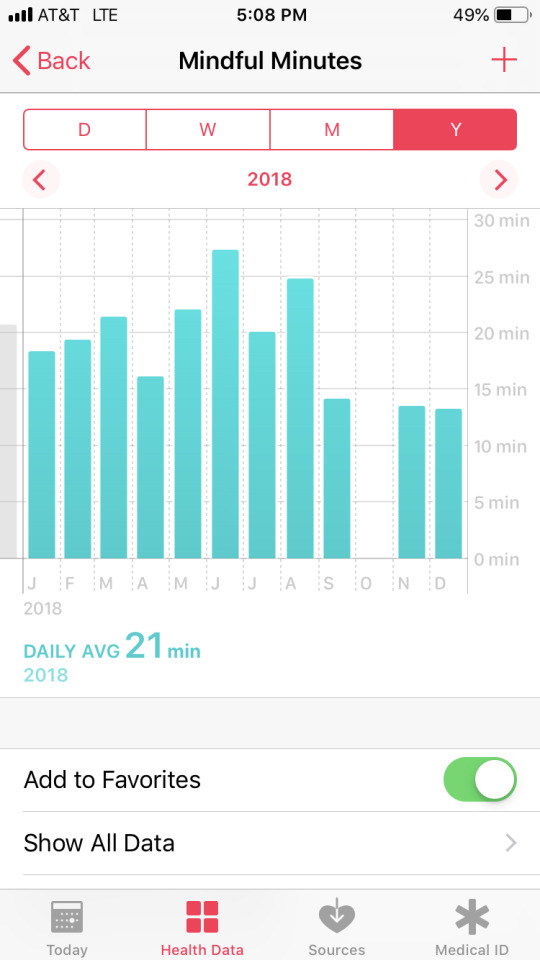
Elliptical/Sauna..
I’m sure I also averaged 20/mins in the sauna for the year but the elliptical I walked away from in favor of shorter runs on the treadmill so.. I sorta traded that and my phone doesn’t track the treadmill so.. you’ll have to take my word that I feel I probably did also get that average. I was in the gym a LOT this year. Ha!
Fed My Head:
I aimed at 12 audiobooks and I did 17. I would love to do even more but editing requires the focus of all the faculties I possess.
I certainly however did not “read more than 10 books.” I read chunks of a lot of books mostly relating to preparing film syllabi and keeping my head in the film problem solving space. But I just finished of Year of Magical Thinking, given to me by my dad after my friend Palma died. It’s a tough read b/c of what the author went through, and not at all what I expected from the title, but I would recommend it for anyone who cares about people :)
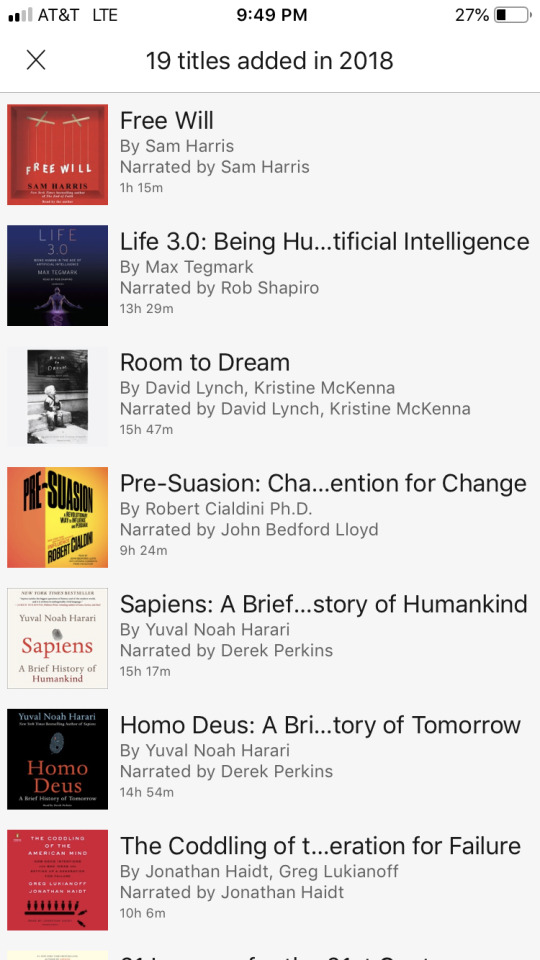
A Very Special THANK YOU to Scott McCarthy
Owner of Balance Strength and Fitness Center www.balancefitnesstraining.com
Scott voluntarily gave me a 4 day workout routine. He tailored it to my situation, a slowly healing elbow and someone who can’t spend 3 hours in the gym everyday.. and while my food and beer habits probably prevented me from losing the belly flab, I definitely gained noticeable muscle in my arms, chest and legs. So, I’m certainly stronger than I’ve ever been and in a pretty well rounded way. Without Scott’s workout plan I’m sure that I would’ve waffled from one thing to the next w/o seeing any results, but with it, I had just the right amount of workout 4 days a week and I was able to push myself each time I walked into the gym. And it was great to know that I had a map from someone who looks like the Incredible Hulk and has been training people for 20 years. He just moved into a new place and upgraded the gym that he owns. He also knows a ton about nutrition and will happily call bullshit on a lot of fads that come through, but he’ll tell you exactly why it’s bullshit. Much Respect! Scott! I owe you some video work, brother! Let’s coordinate and we’ll put some cool spots together for the gym. If you (dear reader) are in the Delaware area and want to get real about training stop reading this and drive directly to his gym… unless it’s really late. Then just go FIRST THING TOMORROW!
Final Thoughts..
I want to thank every single person who read this thing even once and especially those of you who shot me a little word of encouragement or a book suggestion along the way privately or publicly. I truly do believe as an experiment it was successful even if all the goals weren’t met b/c I did have the idea of being held accountable for my actions in mind probably more than you’d imagine. And while it didn’t keep every cheeseburger or cigarette out of my face, it did get me to meditate on weeks where I might not have at all. And the fact that I mediated a few times or ate healthier a few times to be able to report that I had done so doesn’t make me feel like I’m somehow a fake. I was as honest as I could be about everything I did and in the case of food, exercise and mediation in service of the audience.. I still get the benefit of each thing even if it isn’t coming from some pure unpolluted source of willpower. I think there’s a bit of horseshit in most ideas that swirl around purity anyway, so.. I’m good with using the blog in the way that I did.
I’m also glad to be done. Ha! I’m happy that I stuck with it for the full year, but.. I’m looking forward to returning to keeping my shameful failures quiet like everyone else online. When I get time I will probably go back and read through the entire year and there’s a chance I might gain some personal insights from that, so I look forward to doing that. And after a borderline belligerent 10 days in New Orleans to celebrate the fact that I’m still standing at 40, I’m also looking forward to getting back to regular exercise (which I did none of in Nola even tho I brought the running shoes :D) as well as returning to eating more like an athlete in training than an idiot with a death wish. I did yoga Thursday and got back in the gym for the first full workout of the new year today - one week after getting back from vacation.
Goals for 2019:
Heart/Mind
Some kind of dinner with people once or twice a month
Keep a daily food and exercise journal
Mediate 30mins/day
Listen to 20 Books
Read 5 Books
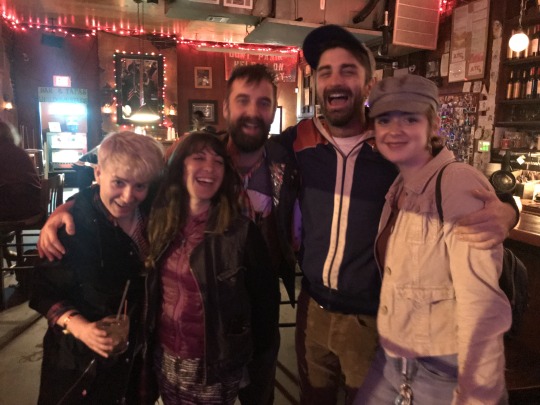
Career
Get the film sold at a festival
Finish a feature screenplay and get lead cast attached
Body
Zero Cigarettes
Lose most of the belly flab - I just signed up for an 8 week fitness challenge at my gym :)
Maintain Gym routine (4-6 days/week weights, 2-3 mile runs 1-2 days/week)
Keep doing yoga once a week
Keep an eye on Blood Pressure
Food
Take probiotic stomach supplements for a year.
Beef no more than once a week (taper down to once a month by end of year)
Quit fast food. AKA - quit being gross, AKA quit using my organs as an industrial sludge filter
Eat more good for your gut stuff in general (straight copying my cousin on his cabbage soup/quinoa moves)
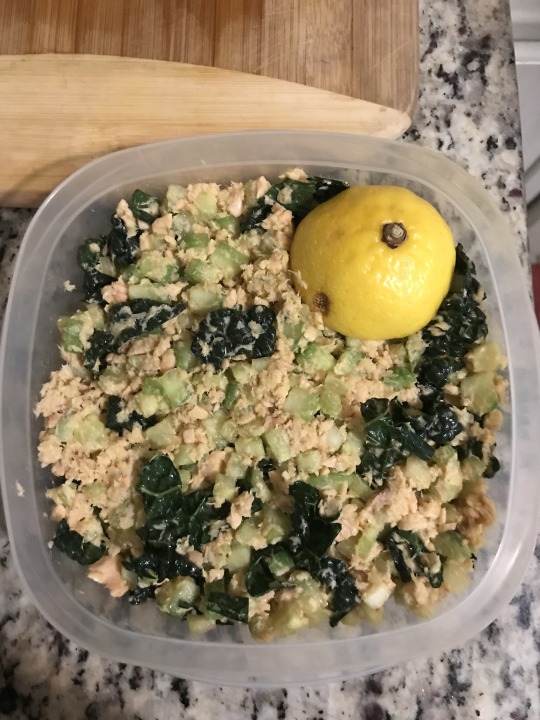
Booze
Alcohol limited to dinner with friends and 1 glass of wine with dinner (I did this wine w/ dinner thing for a stretch of time in the past. It worked and I like it). Not drinking makes it a lot easier to quit smoking as well - I once quit both for 9 months.. I did the one glass of wine/night all last week. It worked. And I’m cutting beer completely for the next 8 weeks so as to get fucking shredded to maximum and win $750 from this god damn fitness challenge.

I think a big part of why some people find it hard to finish writing books.. or anything is b/c they don’t feel like the end is good enough.. and maybe this end is lacking. I put off writing it for a couple weeks b/c I wanted to make it special in some way.. I wanted it to feel like an amazing ending.. but done is better than perfect and I am now done. I love y’all! I really do! Thanks for all the support!
And remember.. “when things look bad and it looks like you’re not gonna make it, then you gotta get mean. I mean plumb, mad-dog mean. ‘Cause if you lose your head and you give up.. then you neither live nor win. That’s just the way it is.” - (fictional character) Josey Wales
Get Mean in 2019 ;)
0 notes
Photo
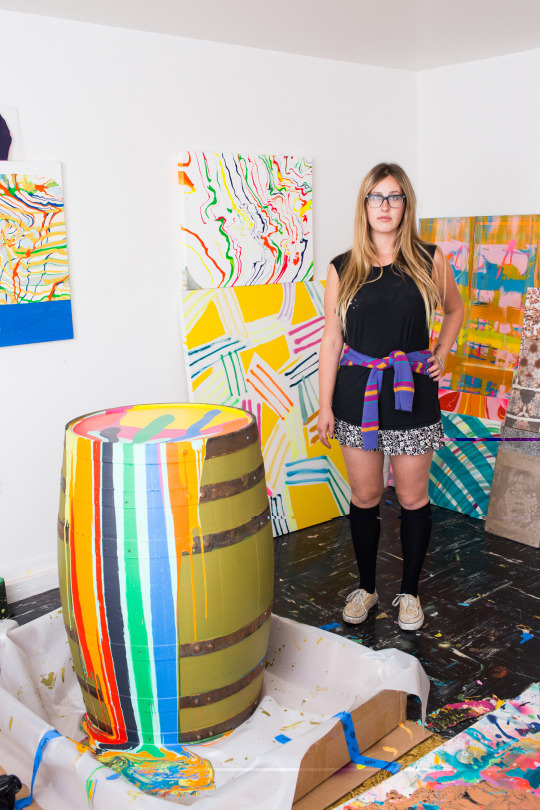
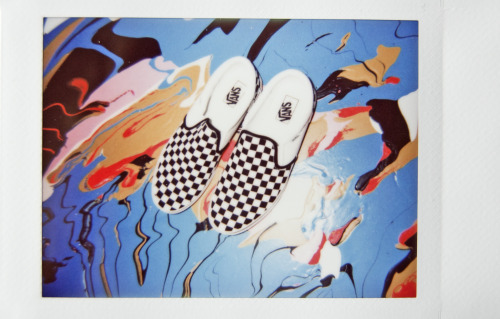

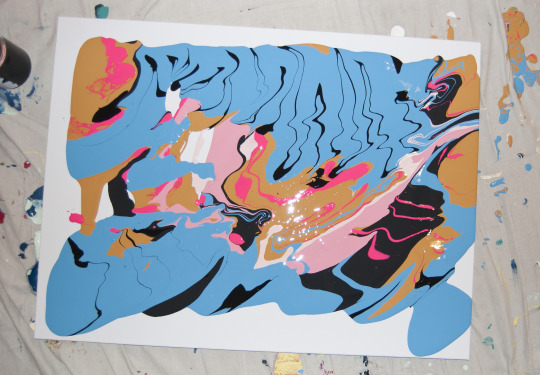

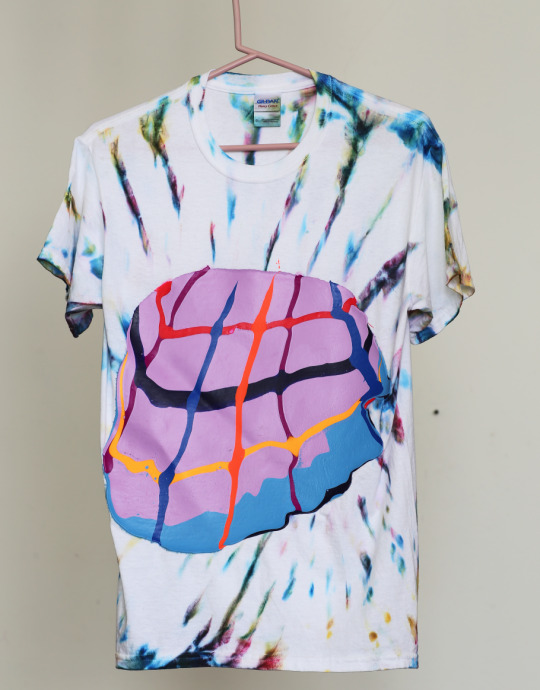
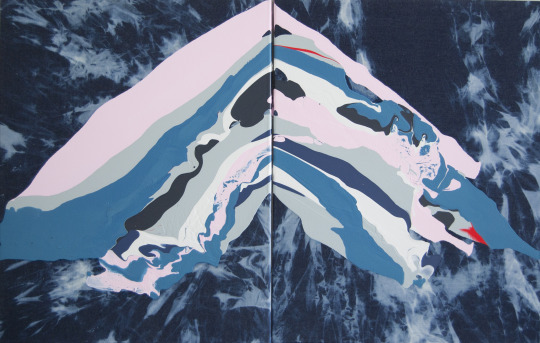
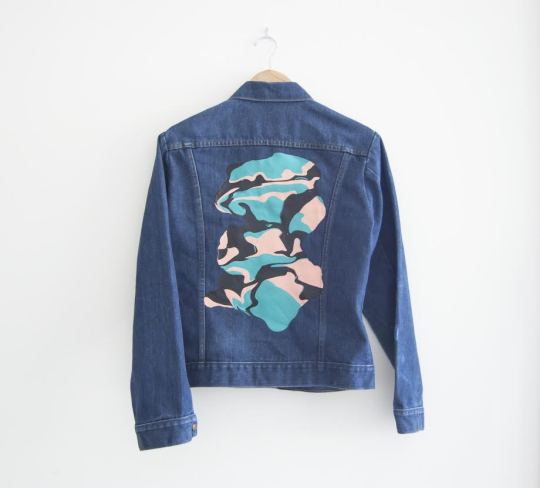
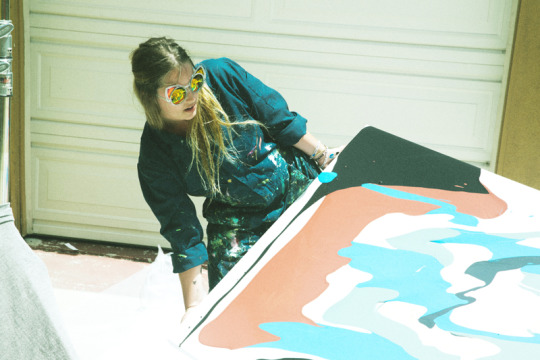
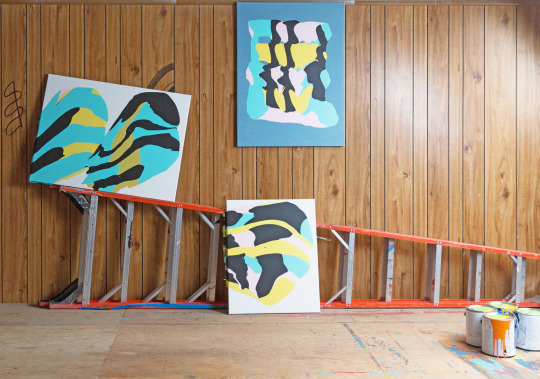
Sketchy Behaviors | Jenny Sharaf (SF)
Never afraid to reinvent herself or her art, San Francisco based artist Jenny Sharaf’s works are fluid and spontaneous; her approach fearless and at times vunerable; and her style cool and comfortably bad-ass. We’ve not only been fans of her visual and abstract creations, but also her passion to work with her community in SF and Oakland to spread art and creativity – from her work with the Lab’s 24-Hour Telethon, The Parking Lot Art Fair to her most recent project- the Public Art Tour. Sharaf shares some insight into her work and process; important issues and themes; and her thoughts on the contemporary arts scene in this installment of Sketchy Behaviors.
Photographs courtesy of the artist
Tell us a bit about yourself and your art background.
My name is Jenny Sharaf and I live with my partner-in-all-things John in San Francisco where we are the parents of an 80lb blue nose pitbull named Lola. Though i live in San Francisco, my wanderlust is at an all time high and if I’m not traveling the world, I’m plotting my next escape.
I grew up in a relatively small beach town in Los Angeles called the Pacific Palisades. Surrounded by salt-licked-waves and girls tanning on smooth beaches, my favorite place growing up was the bluffs; where I could sit above it all and watch it from a distance. I certainly was not your typical California beach babe, but I was wildly inspired by its appeal.
I found myself in San Francisco and went back to school at Mills College to receive my MFA. At Mills my ideas about feminism and California culture collided and my art was heavily influenced because of it.
My life now is a state of constantly making art. Whether it be painting, working on something digital or organizing big public art events in the city, or climbing some construction scaffolding in Paris to smack one of my stickers on the side of a building, I am always finding news ways to reinvent myself and my art.
How did you end up creating art and doing it professionally? And what have you learned along the way?
I’m just doing what I love doing and sometimes people agree to pay me for it. I create new work and new concepts non stop, I contact people that inspire me in hopes of collaborating. Even though I’m afraid at times to be vulnerable, I put myself out there every single day in hopes of new people discovering my art and hopefully falling in love with it. Being an artist can feel very scary, I think maybe I love being scared.
You’ve mentioned “process” as an important aspect of your work. Could you take us through your creative process?
When I’m in the studio or working on a project on site, I always love that intense moment of chance and not having a plan. It takes a serious level of trust in yourself and the materials. Those are the wonderful times that feel one-the-line and frightening, but are always rewarding. In those painting meditative moments, I have no sense of time and space. My best work and most dynamic ideas come out of a period of making and thinking simultaneously.
What important issues and themes do you find yourself and your work drawn too? Why are these important to you and how do they permeate into your works?
Artists are vitally important to our culture, our story and our future. They represent our freedom of speech and expression. The contemporary moment that we are living in feels very historical. Artists are more necessary now than ever and we all should critique the world around us through whatever means possible. As I’m finishing this interview, I’m watching Trump’s first week in office. It doesn’t feel real, but it very much is. This is a call to duty. This is the first president that rose to power on twitter and a tv game show. Currently it’s scary times. I suggest everyone find a great apocalypse outfit.
The colors and abstract drips of your work are some of our favorite things. You recently created a beautiful interior for last year’s Fog Fair and a mural for the Ace Hotel in Palm Springs. How did this come about and how do you approach the design of interiors and exteriors?
Both of these opportunities came through curators & designers following me on instagram. Charles de Lisle and Cultured Magazine invited me to collaborate with them on a “reading room” for the FOG art fair. It was a lot of fun and it was a moment to make something large, inclusive and accessible to an art crowd. For Ace Hotel, their art director at the time; Matt Clark, approached me after seeing an instagram post by artist, Thomas Campbell. The art world is sometimes a really nice place after all! It’s also really wonderful when one project leads to the next.
Whether you’re calling it “placemaking" or whatever new buzz word we’re using, it’s rewarding to create a work of art that people want to include in their own story. I will always love painting on canvas, but it feels much more exciting to do “murals” or large-scale installations, where the audience can insert themselves and interact with the art directly. It’s less egocentric, even though I do always appreciate a @tag :), but mainly just so I can see others enjoying my work!
From painting, murals, videos, installations to paint on paper and digital works, do you have a preferred medium and if so what do you specifically enjoy about it? Is there a medium you’ve have yet to tried and are dying to?
I’m always dying to try new things, new ideas, new materials. I probably have about thirty ideas going in my head at any given moment. As as a preferred medium, I love paint and always have. It’s the most temperamental and if you do the dance, it will talk back in this amazing way. It’s literally fluid (duh), so you have to be a bit go-with-the-flow to fully embrace the stuff. There’s nothing better than a painting session with your headphones blasting and paint just flowing oh-so-naturál. There are a million things I want to try that I haven’t yet. It’s hard to predict where it will go….That’s part of the reason I love being an artist.
What has been some of the best art advice you’ve gotten and some of the worse?
Best art advice– Dream bigger. Don’t be shy. Don’t glass-ceiling-yourself.
Worse art advice– Be practical and realistic.
Not only are you a passionate artist, but you’re really activity in your community with various projects that are focused on community engagement and about promoting the arts. Can you talk specifically about how you founded The Lab’s 24-Hour Telethon and tell us about it and its purpose. What other community based activities are you working on or currently developing?
Throwing big art events in the Bay Area is really important work to me it helps keep the art scene alive for the community and for myself. I was approached to come up with the task to raise money for the The Lab. I grew up on TV and I’ve always been particularly enamored by it because my parents were in the business. They were TV journalists and were always deep diving into the life of some interesting personality. I loved the idea of bringing that to life in a new form and so the The Lab’s 24-Hour Telethon was born. It helped majorly that Cinefamily had been doing a super awesome telethon as well. It was in the zeitgeist. San Francisco needed a version. It ended up being a big success that I am extremely proud of. Since then, I’ve done projects with San Francisco’s Department of Public Works that involves giving new life to public places by highlighting our local contemporary artists.
Most recently, I’m working on a program called Public Art Tour. It’s going to be an online experience and a series of big public events, bringing attention to local artists and San Francisco’s downtown public art. We are scheduled to do a massive party under the Bay Bridge, closing down the Spear Street’s cul-de-sac and making some legally permitted-noise;) Maybe Vans wants to set up a skate ramp? Call me.
The Parking Lot Art Fair that you founded in the Bay Area sounds like a super fun and exciting get-together. How would you describe this event to folks? What has been the best aspect of this for you?
It was a blast. Basically, The Parking Lot Art Fair was a renegade art fair outside of a “legit” art fair at Fort Mason (in San Francisco). All the artists set up very very early morning, as soon as the parking was free and permitted. At that point, the chaos began. The best part was being able to see the Bay Area art scene spread out in oceanside parking lot and realizing how much talent and weirdness this place still has left. San Francisco and Oakland have had many growing pains in the last few years and because of it the art scene has also foregone many changes. In terms of housing costs (studio space, etc) a big portion of our community has had to leave. So to be able to celebrate a more fringe art scene feels insanely gratifying.
How would you describe your personal style? Favorite Vans?
My personal style is all over the place. I like to be comfortable. When I’m not in my painting white or navy onesies and painted Vans (raw canvas pair I’ve probably had for 10 years), I love to play with fashion and try on different looks. Right now my look is very Gloria Steinem plus a sixties-Italian-cyclist inspired; ripped black jeans, my boyfriend’s cashmere sweater and a fringe black suede jacket. I always wear sunglasses - my look never feels complete without them.
My favorite vans are the classic black and white checkered low tops. They always look effortless. OR the high top surfer-girl-chic sneaks.
Name 5 of your favorite artists, followed by some of your top 5 favorite bands / musicians to create too.
Artists: Helen Frankenthaler, Joan Mitchell, John Baldessari, Joan Brown, Alicia McCarthy
Music: Paul Simon, alt-J, Jungle, Ace of Base,Haim
What are your thoughts on the state of contemporary art? The good, the bad, and the ugly.
The good - the art world is accessible than ever because of social media and the internet. You can basically get anyone to see you work these days, which is a big change from ten years ago.
The bad - there’s still a lot of old white guys that seem undeserving of shows, but they know people and they already have money to create massive bigger-the-better machismo art.
The ugly - the art world is huge, and can be incredibly hard to navigate and can be mean. We should all work harder to be nice to each other, especially about something as special as art.
You’ve worked with various clients and done many collaborations. What have been some of the most rewarding projects? What do you like best about collaborations and what are some of the aspect you’d like to see changed or evolved if any?
I love collaborating with cool brands. Working with the Ace Hotel is always awesome. Such great people and a company that really gets the creative experience. I just worked with this handbag line Luana Italy. They really let me do whatever I wanted and honored my voice as an artist, which I always greatly appreciated. I think big brands are finally embracing and empowering the artist's’ voice– allowing the space it takes to achieve that.
What would you tell folks who want to follow in your footsteps? Pitfalls to avoid and/or words of inspiration.
I’d say, don’t follow in anyone’s footsteps. That’s always something to remind yourself. Make your own path and listen to your own visual / conceptual impulses.There is absolutely no rule book or how-to guide to being an artist. It looks different for everyone. I by no means have figured it out, but I do try to practice trusting the inner voice and taking risks.
Lastly, what’s up for 2017? Any exciting projects you can let us in on?
For 2017, I plan on working hard, painting like a madwoman and traveling. I’m doing some fun projects with B&O Play by Bang and Olufsen as a cultural ambassador- public art events, listening parties, contemporary art experiences. Also, I’m curating a weekend at Ace Hotel and Swim Club Palm Springs on March 18th called “What’s Your Name / Who’s Your Daddy” featuring Sahar Khoury, Alicia McCarthy, Francesco Igory Deiana and Jess Meyer. Also, planning some mural projects overseas, but it’s too early to talk about. Don’t want to jinx it! Follow me on instagram to keep up with it all:)
Website | Instagram | Public Art Tour
84 notes
·
View notes
Note
What have been your favorite college memories (across all of your colleges)? How often do you talk to your classmates outside of your classes?
Hi, nonny!
Oh, man. I feel like I should preface this with a disclaimer that I am i n c r e d i b l y boring. I follow rules and had my first sip of alcohol on my 21st birthday and my idea of a party is getting like 4 people together for a game night and eating way too much junk food. So like... my favorite college memories aren't overly exciting haha
Rambling about those memories under the cut cuz this got a little long
I didn't really like my undergrad. The people in my program were great, and I had some fantastic professors, but my school just... Did Not Care about my program. Like most people on campus were genuinely not aware that our university even had a school of arts & humanities let alone a literature degree. I can't even count the number of times people would ask me what my major was only to be shocked that it was a thing or to immediately launch into a lecture about how that was a dumb thing to get a degree in 🙄 Also, our mascot was terrifying and not in a good way. In a "hi, I'm going to go be anywhere that is NOT HERE" as soon as you see him way. (Seriously, I hate him so much) I also just really don't like Texas, so that didn't help either. And it was mainly a commuter school, but I lived on campus and didn't drive. Which also limited social options. However!! I made some really great friends there.
I don't talk to them all constantly anymore, but I was usually texting at least one of them every day while I was in school there. My two roommates from freshman year are still good friends of mine. I actually share a birthday with one, and we got together for a nice dinner on our birthday in 2020 like right before the pandemic got bad. I have a couple other friends I still message here and there and some who I trade Facebook likes with, but we've drifted more. My favorite memories from undergrad were things like our 6-hour Guitar Hero marathons, going to IHOP with one of my friends at like 12am, and waiting to go grocery shopping at Walmart with another friend until it was almost 11pm because there was a Whataburger in the parking lot of that Walmart and they start serving breakfast at 11pm and she always wanted a honey butter chicken biscuit 😂
As for friends from my master's program, there are like four of us who formed this little unit our first year, and we talk literally every day, just like we have for the last three years. We have a group text and a Discord server and weekly hangouts and it's amazing. (Love y'all 💜😘) It was super common for at least one of them to text me and be like "can I come over and do homework?" and like of course you can. We'd just like hang out on the couch with our laptops and do our work in the same room and it was really nice. Those are the memories I'm fondest of 💜 Also our game nights would go super late (and can now go even later since we're all just on our respective computers in our own homes). Outside of that core friend group, I was friends (or at least friendly) with a lot of other people in my program. Like, I literally would have moments where I'd be like "how do I know so many people and have consistent positive interactions with them???" because it was such a foreign concept to me. (I'm not usually the popular type--I'm kind of anxious and not super social unless I'm in my element.) Everyone likes to say that college is like the best time of your life or something, but honestly? My undergrad experience was mediocre at best. Grad school, on the other hand, was honestly a blast. Like, yeah, I had a lot of work and it was stressful, but those two years were two of the best years I've ever had.
With my doc program, we don't talk as much, I guess. One of my cohort mates and I set up a Discord server for the cohort, but since we all started in the middle of a pandemic, we were literally all over the world. We didn't get to do the mandatory doc classes in person, so we didn't get that real cohort bonding so much. Also my cohort is ridiculously huge. We make up like 1/3 of all doc students in our program. It's insane. Even so, there are a few I've become a lot closer to, especially this past semester. I'm actually rooming with one of them starting in about a month, and we pretty much text every day now. (She's literally so cool, y'all) There are like two or three others who I talk to somewhat regularly and I feel comfortable chatting with them and venting. There are a few others I talk to less consistently, but I'd consider us casual friends at least.
Overall, most of my favorite memories about school are weirdly not so much related to school itself. Like, I will always remember my first conference presentation or the first class I taught, but when it comes down to it, having that support network is so, so important, especially the higher you get in academia. Like, I'm super lucky that my brother also went to grad school (he's got an MFA in game design), so I was able to talk to him about a lot of this stuff, which helped a lot. But my friends really helped get me through, and I like to think I helped them as well. They're some of the best people in the entire world tbh and I'm super sappy with them (and also just in general. Normalize telling your friends you love and appreciate them!)
0 notes